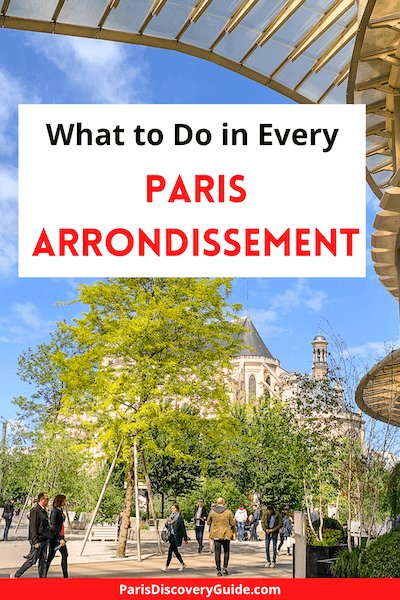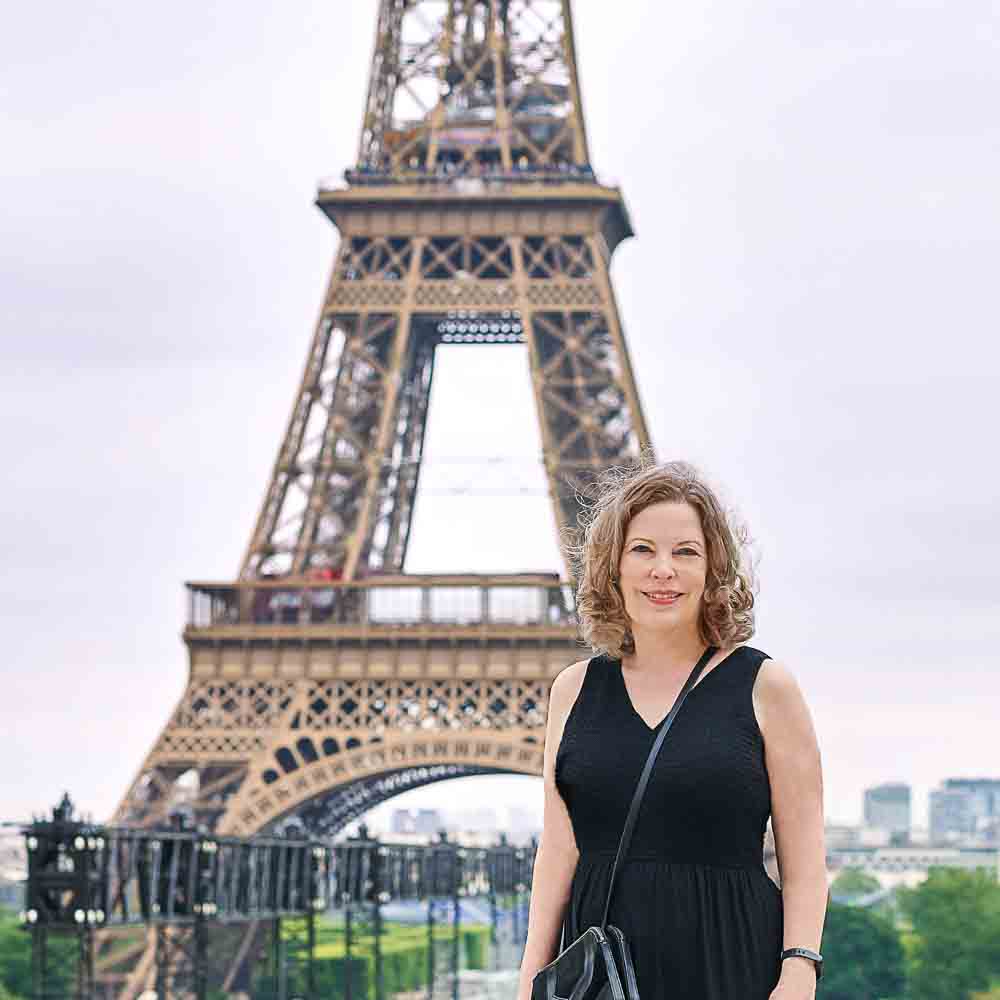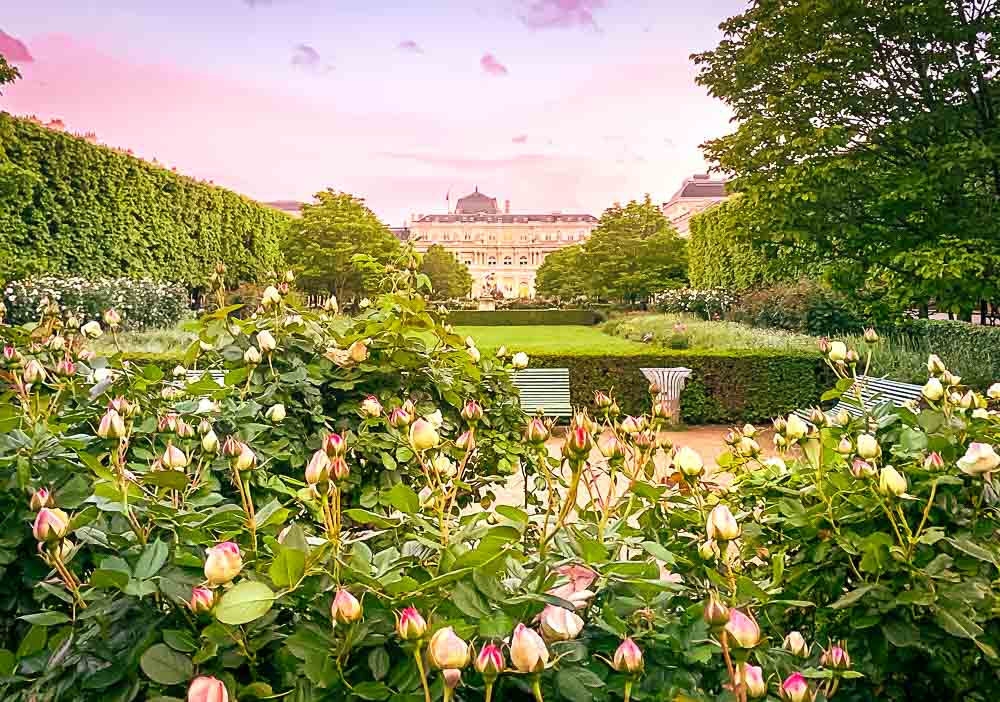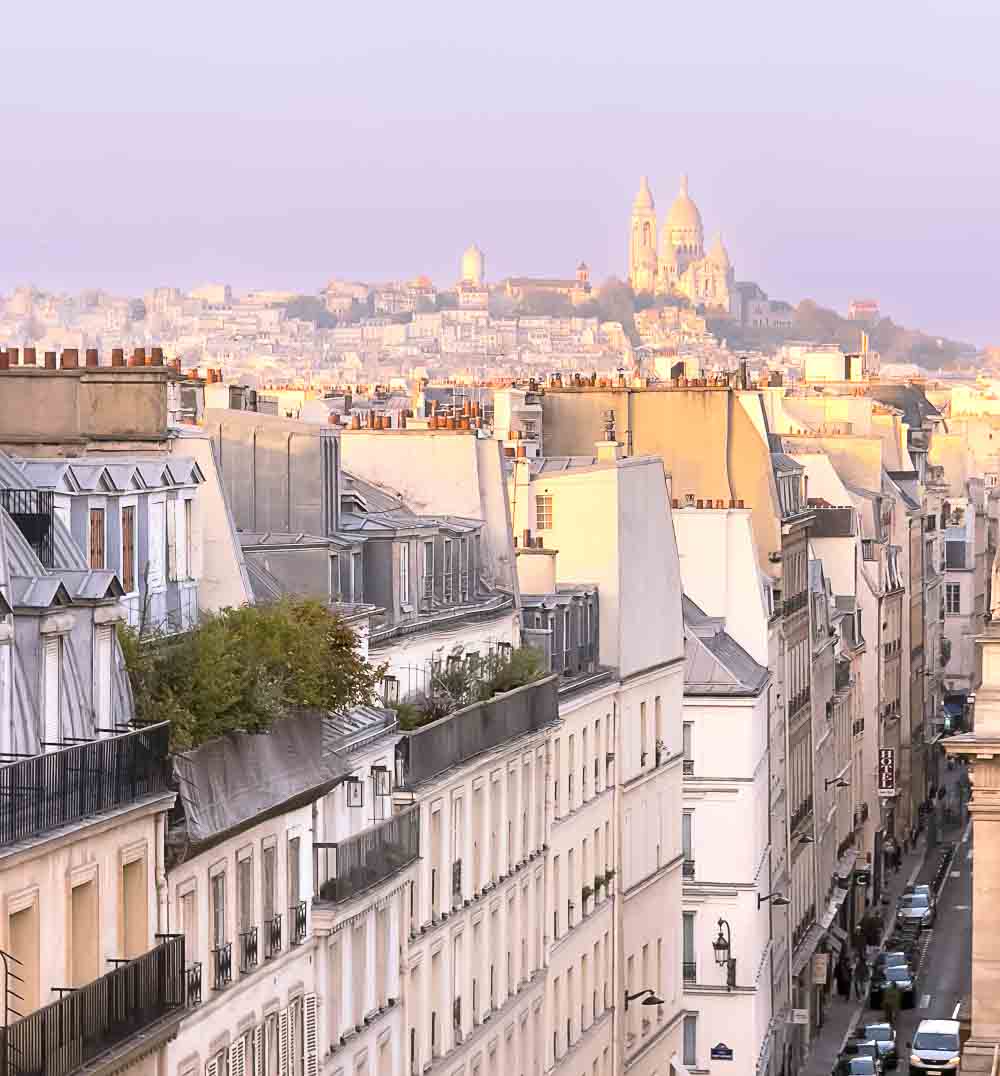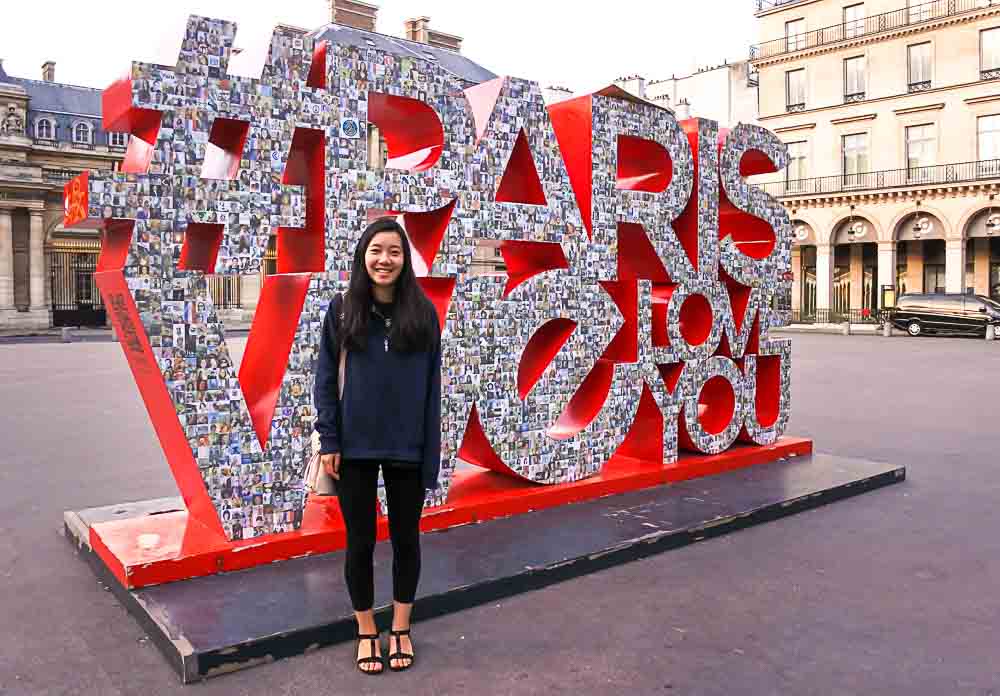If you're planning a visit to Paris, you've perhaps already come across the word "arrondissements" and maybe figured out that it somehow relates to location. But what exactly are Paris arrondissements?
Basically, arrondissements are administrative districts. Despite being a fairly compact city, Paris contains 20 arrondissements. Instead of having names, they're known by their numbers: 1 through 20. So again, at a basic level each area designates a specific area, or part of the city.
Are arrondissements the same thing as neighborhoods? No, neighborhoods have their own identities and boundaries.
Some arrondissements such as the 1st may contain two or more distinct neighborhoods, while some neighborhoods such as the Marais span more than one arrondissement.
You might reasonably think that if arrondissement numbers simply designate an administrative area, you don't need to give them another thought, right?
But in reality, you do because everyone uses the numbers to mean not only location, but much, much more.
Here's why:
Each of the 20 Paris districts has its own unique identity, history, and personality, and vibe, along with popular attractions, special events, and other interesting things to do and see.
So when someone says to you, "You would probably love staying in the 8th," that means that you might like the leafy Right Bank location along the Seine River as well as the many designer boutiques, wonderful bistros, occasional views of the Eiffel Tower, and elegant, upscale vibe.
Favorite Paris Arrondissement Tours
Although these tours (which are among my own personal favorites) focus on neighborhoods within and across arrondissements, they give you a great way to feel the vibes of each special area:
- Food & Wine Tasting Walking Tour in Le Marais - Small group tour in the 3rd & 4th arrondissements - highly rated
- Iconic Paris Neighborhoods Guided Walking Tour - Choose from several different neighorhoods; discover top attractions and secret places
- Montmartre Cheese, Wine, & Pastry Guided Walking Tour - Highly rated food & sightseeing tour in the 18th arrondissement
Whether you're planning your first visit or a return trip to the City of Light, knowing which Paris arrondissements have the attractions, activities, neighborhoods, and events you want to experience will help you make the most of your time, decide where to book a hotel room or reserve an apartment, and discover more to do and see nearby.
In our Paris Arrondissement Guide below, you'll find a quick explanation of the city's layout, an interactive arrondissement map, highlights about top neighborhoods, destinations, activities, major events, tours, and hotels in each district, the best arrondissements to stay in based on what you want to see and do, and tips for using the district numbers to help you plan your trip to Paris.
We've packed lots of useful information into this article, but it's long. If you're looking for details about a specific topic or district, use these Quick Links to find it fast:
Arrondissements Guide: 1st Arr - 2nd Arr - 3rd Arr - 4th - 5th - 6th - 7th - 8th - 9th - 10th - 11th - 12th - 13th - 14th - 15th - 16th - 17th - 18th - 19th - 20th - FAQs
Top photo: Paris arrondissement map, (c) Paris Discovery Guide
Paris Discovery Guide is a reader-supported publication. When you buy through my links, I may earn a small commission at no additional cost to you. Merci beaucoup for your support!
Paris Arrondissement Map: Understanding the City's Layout
You'll find single-digit arrondissements in the center of Paris, which is also the oldest part of the city. They are where you can explore most of the top historical attractions and not surprisingly, find the most tourists.
As you can see when you look at our Paris arrondissements map below, districts with higher numbers spiral out clockwise from the center (kind of like the shell of a snail, or that favorite French food, an escargot).
The city of Paris annexed most of the outer arrondissements such as the 18th, home to the Montmartre neighborhood (as well as others), back in the 1800s when they were villages, and you can still experience plenty of their original charm.
They are mostly residential and aside from the gorgeous Sacre Coeur Basilica perched on the highest hill of Montmartre and a few popular attractions such as Atelier des Lumières in the 12th and Père Lachaise Cemetery in the 20th, you usually won't see many tourists. So if you want to experience a more authentic part of the city away from the crowds of visitors (and usually with cheaper hotel rates), this is where to come.
Our interactive Paris map shows the 20 arrondissements with attractions and landmarks, the city's two great forests, the Seine River, and top attractions plus a few key destinations outside of the city such as Versailles, Disneyland Paris, La Vallée Village discount shopping center, the La Défense business district, and the three closest international airports.
Zoom in to get a closer view of Paris streets and neighborhoods, or zoom out to see more of France.
Right Bank, Left Bank, and the Seine River Islands
The blue line of the Seine River divides the city into the Right Bank (above the river) and the Left Bank below it.
In the middle of the Seine are two small islands, Île de la Cité and Île Saint-Louis.
Île de la Cité, the historical heart of the city includes parts of the 1st and 4th arrondissements. This is where the area's first settlers, a Celtic tribe called the Parisii, made their home over 2,300 years ago. It is also where you'll find some of the city's most famous attractions.
Île Saint-Louis belongs to the 4th district, and is a quiet residential area with 17th century homes, a main street lined with boutiques and bistros, and a few small upscale hotels.
The large green areas at each side of Paris (think of them as the snail's head and tail) represent two enormous tree-filled parks (bois), sometimes called the "lungs" of the city because their many trees contribute to the quality of the city's air.
The Périphérique: Paris's Circle Road
One final thing you should know about Paris's layout is that an almost-constantly congested multi-lane highway, the Périphérique (Parisians normally call it "la Périph"), circles the outer districts (but not the parks).
If you take a taxi or private transport to or from Charles de Gaulle Airport, you'll most likely experience the Périph first-hand - for better or worse. (Usually for worse, unless you're very, very lucky.)
Paris Arrondissement Guide
Now, let's take a look at the landmarks and attractions that make each arrondissement special to help you choose where to stay and what to see and do during your visit.
1st Arrondissement: Louvre Museum, Sainte-Chapelle, Les Halles, Tuileries Garden
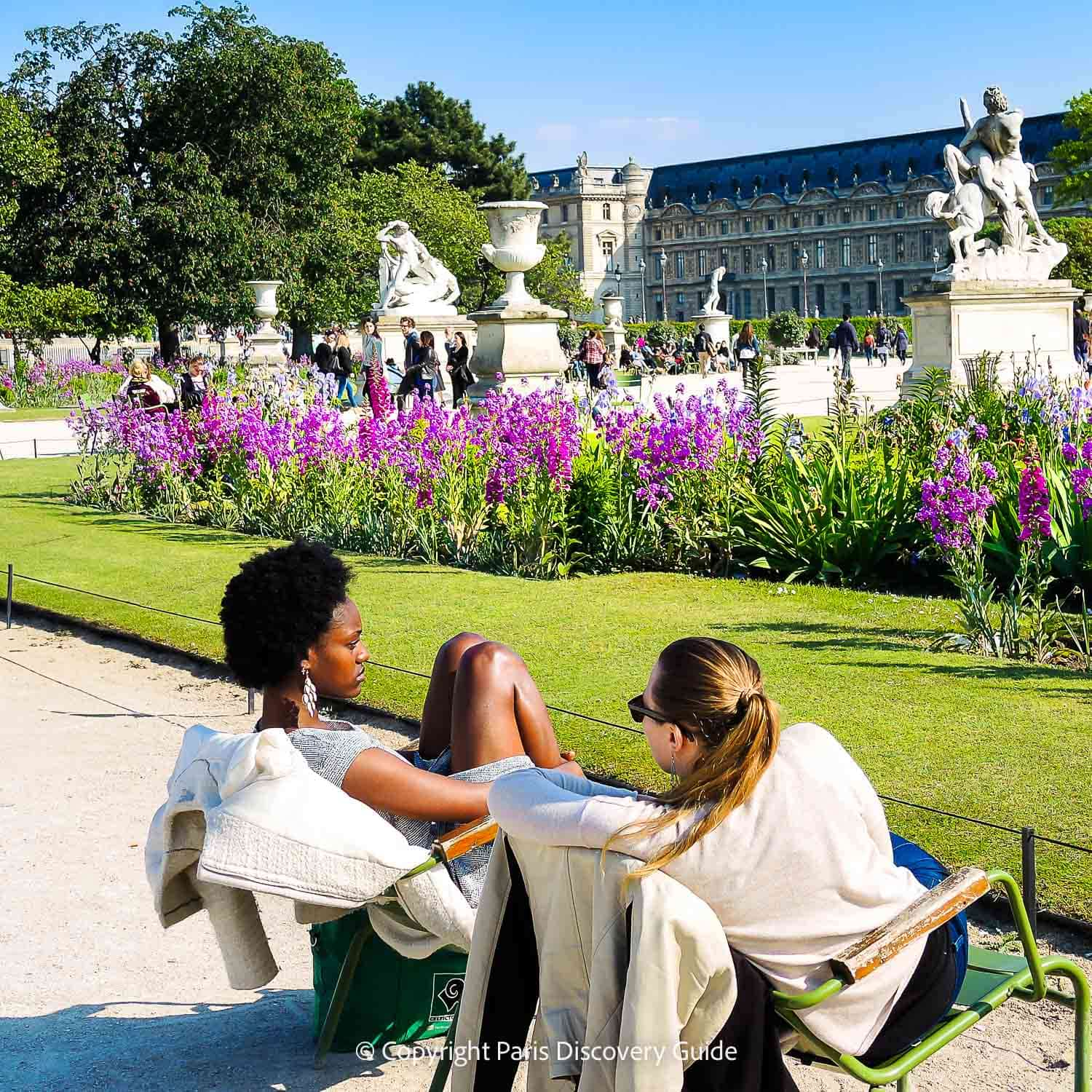
Why visit: Famous attractions, spectacular gardens, and excellent cafés, restaurants, and boutiques pack the 1st arrondissement with must-see "bucket list" sights for first-time as well as returning Paris visitors.
Sometimes call "Royal Paris" because the kings and queens of France once made the area the Louvre, Palais Royal, Tuileries Garden, and Ile de la Cité their home.
Top Attractions in the 1st Arrondissement
Discover: The Louvre Museum, home to the Mona Lisa and many other treasured works of art. Tuileries Gardens, filled with flowers and statues, pools and fountains, cafes, and a giant ferris wheel. Musée de l'Orangerie, featuring Monet's lush waterlily paintings. Place Vendôme, surrounded by exclusive jewelry stores, fashion boutiques, and the Ritz Paris hotel. A visit to Musée des Arts Decoratifs is a must if you're into design, decorative items, or just like beautiful things.
Find more ways to experience the Louvre
Experience: Royal Paris in the almost-hidden Palais Royal Garden and shopping arcades, two of the city's biggest and best Christmas Markets during November and December, the soaring stained glass windows and concerts at Sainte-Chapelle, and Marie Antoinette's last days in the Conciergerie, a medieval palace and infamous Reign of Terror prison.
Discover the Mona Lisa & Other Iconic Masterpieces at the Louvre
The Vibe: Elegant, lively, historical, with almost-hidden pockets of tranquility
Shop: Famous designer boutiques along Rue Saint-Honoré, covered passages from the 19th century, and the Paris's most popular French cookware shops in the Les Halles neighborhood pack the 1st.
Explore: Les Halles, once the city's largest food market before being torn down in the name of urban renewal and then rebuilt as a glitzy city shopping mall, now attracts enthusiastic crowds with its new shopping, entertainment, and dining plaza. Don't miss the jazz clubs in nearby Rue des Lombards, or the food shops and cafes along epic pedestrian-only market street, Rue Montorgueil.
Eat: The 1st arrondissement is packed with a huge variety of places to eat at every price point. See my recommendations for where to eat near the Louvre Museum if you're in that area. One of my favorite spots for an affordable and delicious meal near Les Halles is Le Petit Bouillon Pharamond, which features traditional bistro dishes.
Visit: Île de la Cité, the tiny Island in the Seine River straddling the 1st and 4th arrondissements where you'll find the historical heart of Paris, including Sainte Chapelle (known for its stunning stained glass) and other medieval masterpieces such as Notre Dame Cathedral (which is actually in the 4th arrondissement).
Fun 1st Arrondissement Wine & Food Experiences
- 2-Hour Seine River Lunch Cruise - See the Louvre Museum and other famous sites in the 1st arrondissement and other parts of Paris as you cruise by while relaxing over a wonderful 3-course lunch
- Wine Museum Guided Tour with Wine Tasting - Tour the former wine cellars of the King of France across from the Louvre Museum, learn how wine is made, find about about different French grapes and wine regions, and taste some delicious wines
Check out my 1st Arrondissement Complete Guide, with more things to do & see
Where to Stay in the 1st Arrondissement
- Top Hotels in the 1st - See my recommendations for best places to stay near the Louvre, Sainte-Chapelle, Rue Saint-Honoré and Les Halles shopping districts, including some of my own favorite hotels in the city
Best places to stay in the 1st District during winter months
See Top Attractions from a Seine River Cruise
2nd Arrondissement - Covered Arcades, Sentier, Bourse
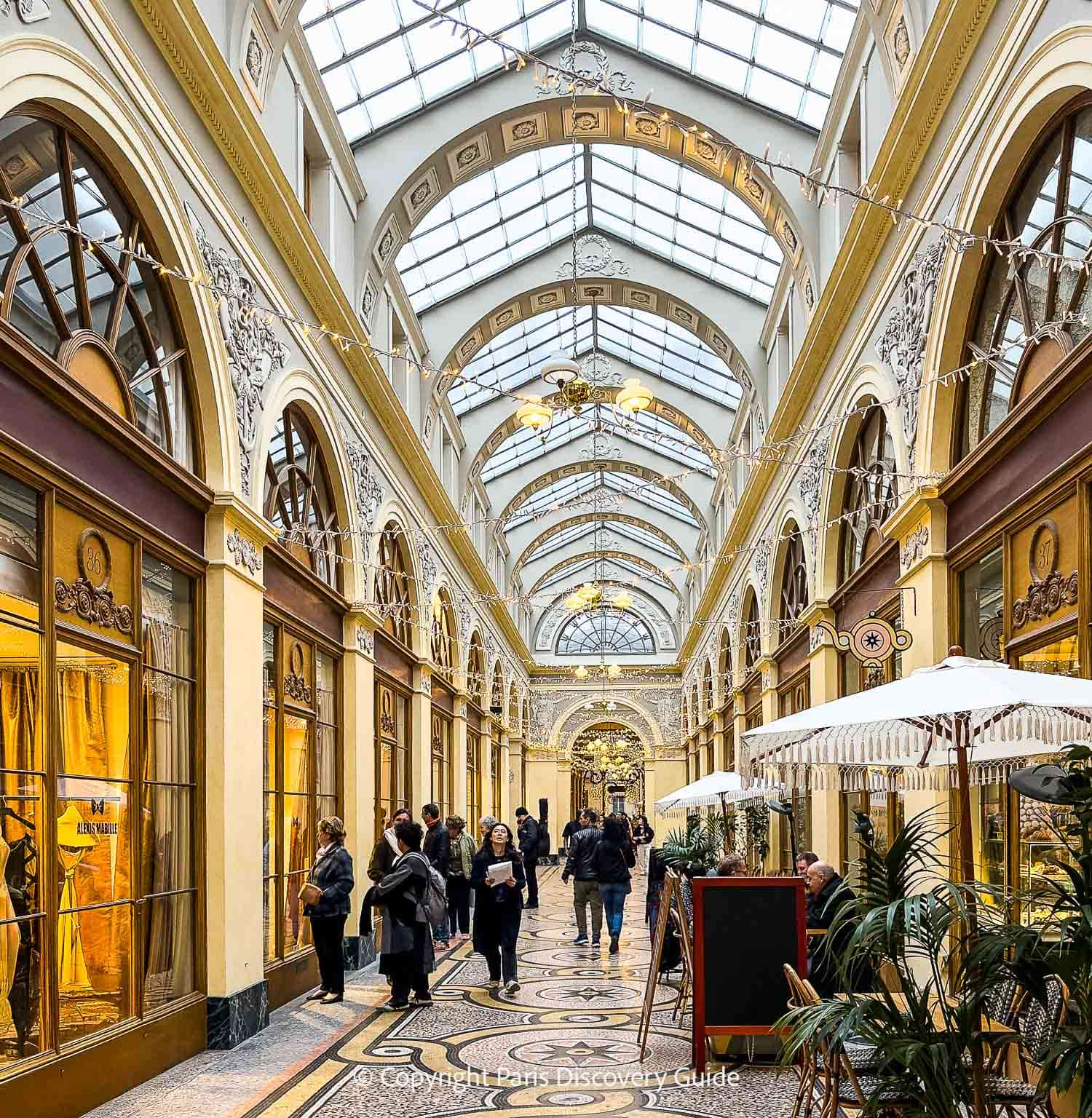
Why visit: You'll love the 2nd arrondissement's covered 19th century shopping arcades, the best Japanese and Korean restaurants in Paris, and fascinating glimpses of the Paris's thriving wholesale textile and design industries in the Sentier neighborhood.
Top Attractions in the 2nd Arrondissement
The 2nd Arrondissement sometimes gets overlooked as being a mostly-business district dominated by the Bourse (Palais Brongiart), the former Paris stock exchange now used for special trade shows, and at its east end by the Sentier quartier, home to the Paris textile industry and wholesale-only clothing showrooms.
However, you'll find lots of wonderful hidden treasures tucked away in the 2nd - especially if you enjoy shopping and dining. And at the lively western end of the district, excellent shopping, hotels, and restaurants near the Paris Opera House and bustling Avenue de l'Opéra attract numerous visitors.
Discover: Japanese restaurants lining Rue Saint-Anne. Designer boutiques around Place des Victoires, and more affordable shopping along Avenue de l'Opéra.
Explore: 19th century Passages Couverts, the glass-roofed covered retail arcades and galeries lined with boutiques and bistros - inspiration for today's indoor shopping malls.
Look for Galerie Vivienne (elegant shops and bistros), Passage du Caire (wholesale textiles and clothing), Passage de Choiseul (Korean specialties), Passage du Grand Cerf (art, crafts, esoteric collections), and Passage des Princes (toys and games).
Treasure hunters will want to explore the stamp, coin, and antique dealers in Passage des Panoramas not far from the Drouot Auction House in the 9th. Explore on your own - or join a secret passages tour.
In and around Sentier, hip restaurants started popping up a few years ago, and now chic hotels are following, making this an increasingly trendy neighborhood for visitors - plus Sentier is next door to the even trendier UpperMarais.
The Vibe: A buzzy mix of chic and industrial, with fascinating slices of old Paris next to the new and trendy
2nd Arrondissement Complete Guide: Find more things to do & see
Where to Stay in the 2nd District
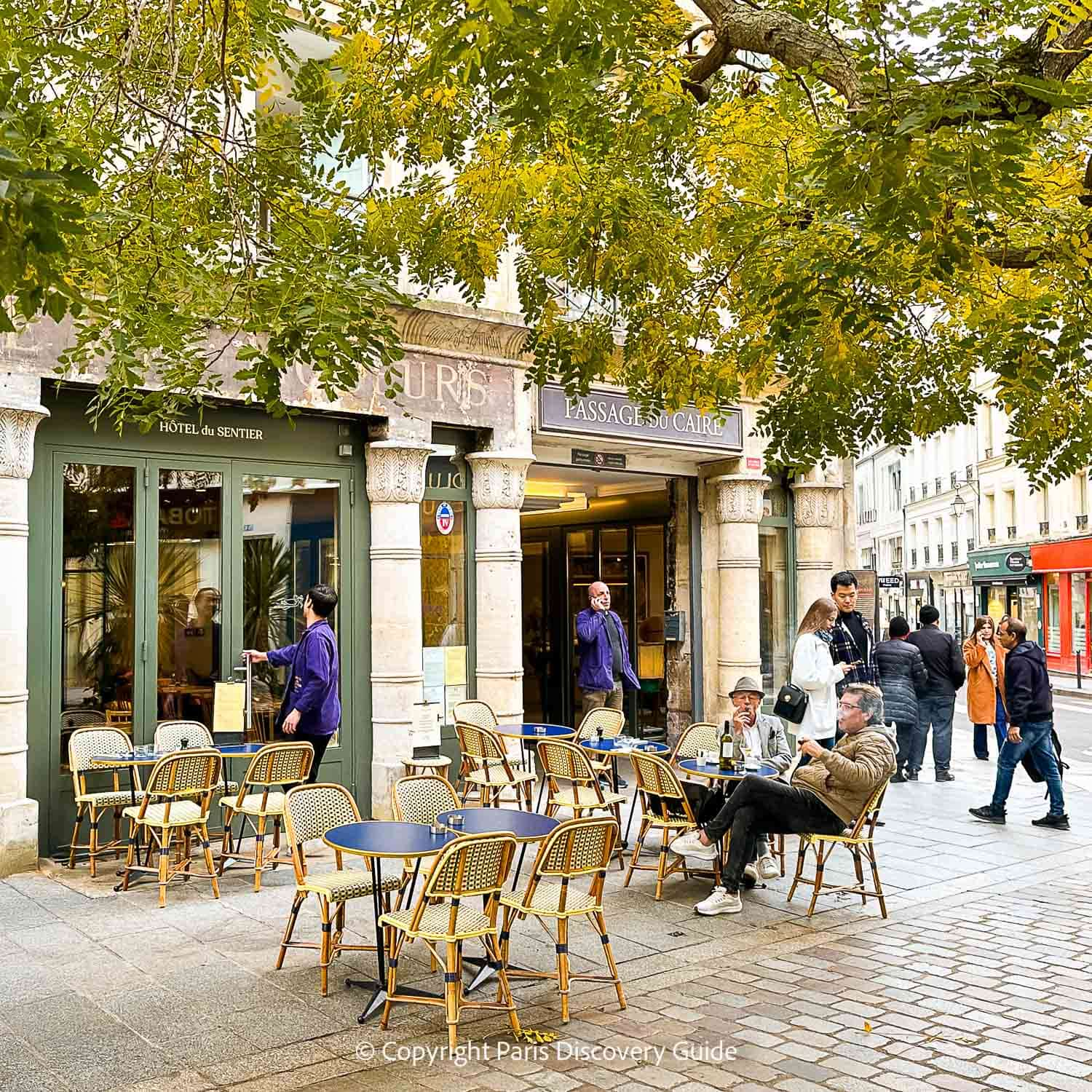
- Hotel Edouard VII - 4-star hotel in a superb location on Avenue de l'Opéra, less than a 5-minute walk from the Paris Opera House.
- Hotel du Sentier - Boutique hotel with 30 guestrooms inside the historical Passage du Caire
- Hotel Bachaumont - Lovely 4-star hotel with an Art Deco vibe on a quiet side street between the pedestrian-only Rue Montorgueil market street and a stretch of Rue Montmartre lined with luxury boutiques.
- The Hoxton - Elegant and contemporary, located in a gorgeous 18th century building in the bustling Sentier district.
Find more hotels in the 2nd arrondissement
Want to Get Around Paris the Fun & Easy Way?
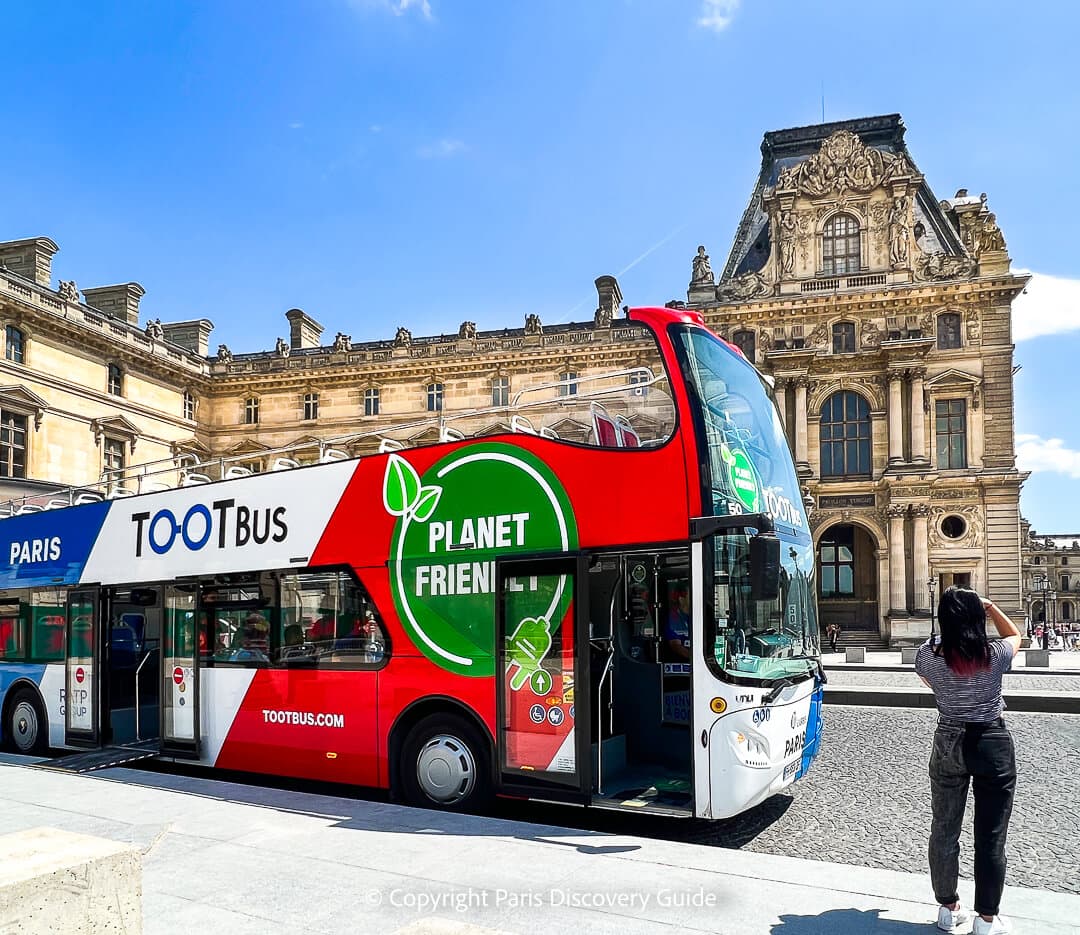
Hop On/Hop Off double-decker buses give you an easy way to explore Paris arrondissement and see the city's top attractions.
Your ticket gives you access to 3 different tour routes past all the famous landmarks, sights, and shopping areas.
Hop off as often as you wish to explore on foot, and then hop back on to see more attractions as you enjoy the panoramic views from the top deck. For a few additional Euros, you can get a 2 or 3 day ticket - a fun and economical way to get around the city as you sightsee.
3rd Arrondissement (Temple) - Picasso Museum, Upper Marais, Musée Carnavalet
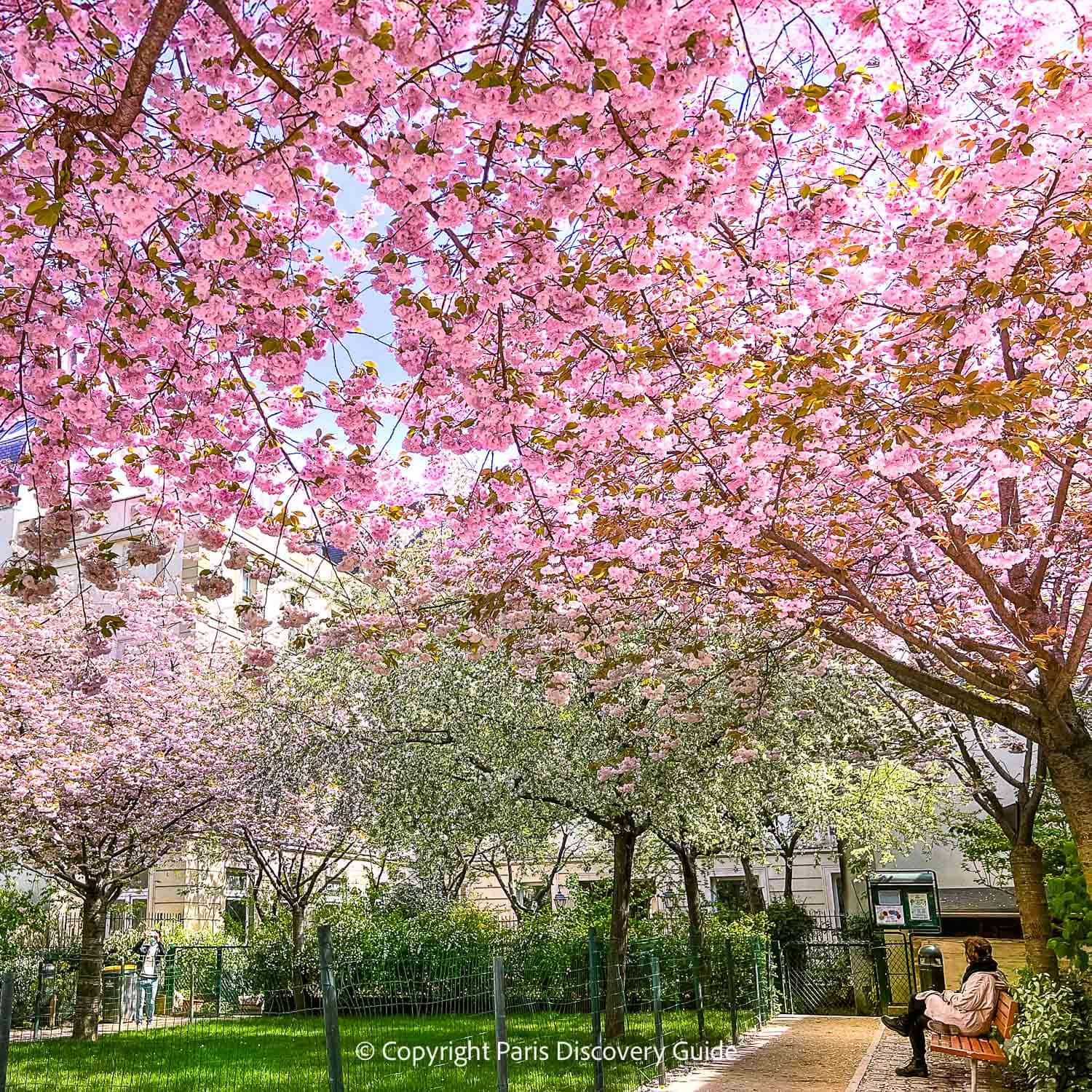
Why visit: Known as the Haut ("Upper") Marais, the 3rd Arrondissement gives you a glimpse of medieval Paris plus plenty of ornate 17th century mansions, popular museums, and fashion boutiques.
Top Attractions in the 3rd District
You'll find a number of outstanding museums here including the famous Picasso Museum housed in a 17th century mansion, Musée des Arts et Métiers with its displays ranging from airplanes to perfume, and Musée Carnavalet.
- Find all the best ways to visit the Picasso Museum
Discover: Jewish culture in France in the Museum of Jewish Art and History.
Dine on tasty couscous or kebabs at an outdoor table next to the food stalls at Marché des Enfants Rouges, the oldest covered market in Paris where residences have shopped for 400 years.
Stroll along narrow cobblestone streets and explore the indie designer boutiques.
The Vibe: Tranquil, arty, family-friendly, with quiet residential enclaves and flower-filled gardens
Recommended Self-Guided Paris Walk: Rue Payenne Gardens
Where to stay in the 3rd arrondissement
4th Arrondissement - Notre Dame, Pompidou Center, Île Saint-Louis, Place des Vosges, Hôtel de Ville
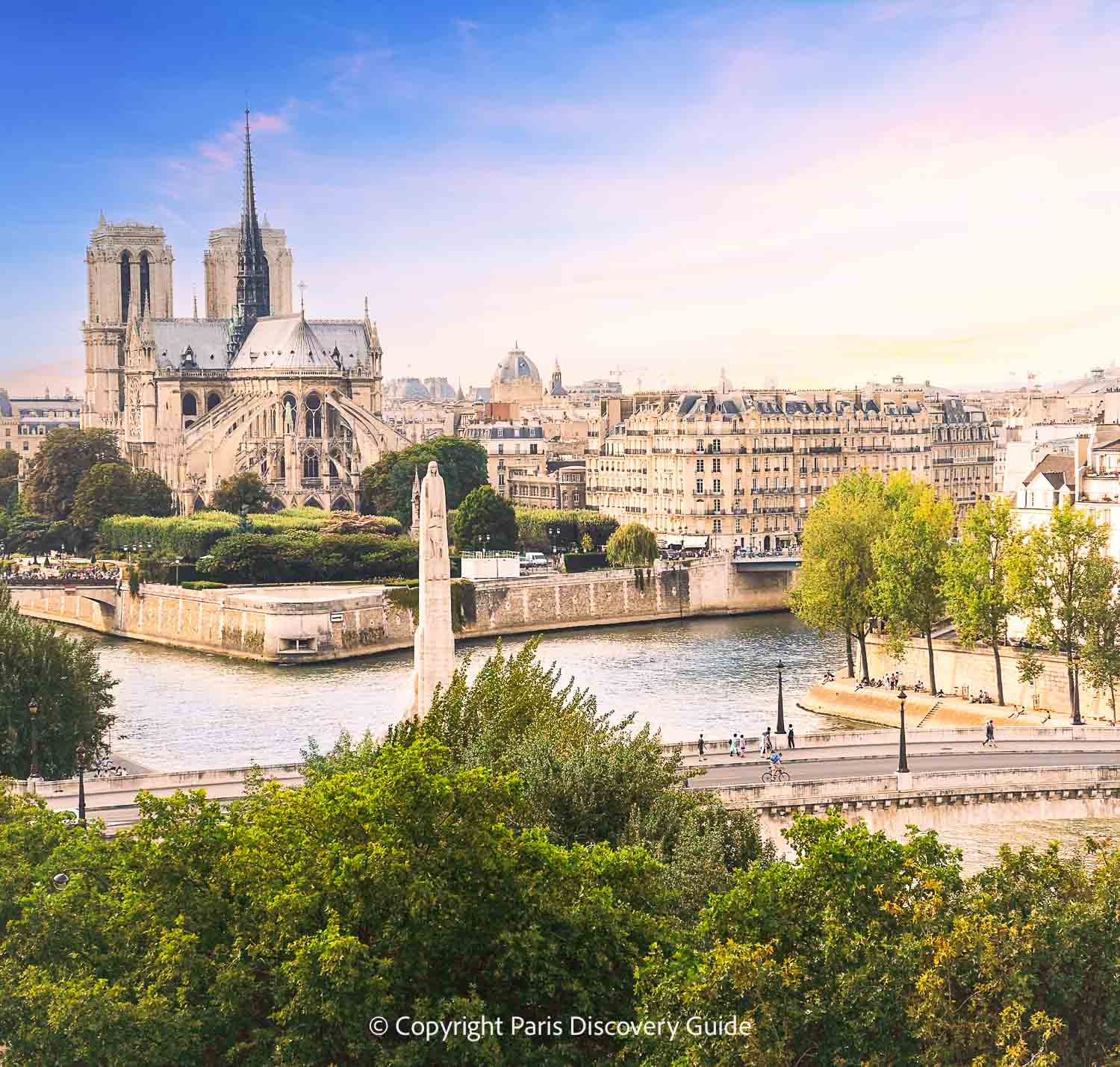
Why visit: The 4th Arrondissement is "must see" area for first time and return visitors. So many famous historical sites and top attractions are located here - plus the medieval Marais neighborhood offers some of the best shopping in Paris.
Top Attractions in the 4th Arrondissement
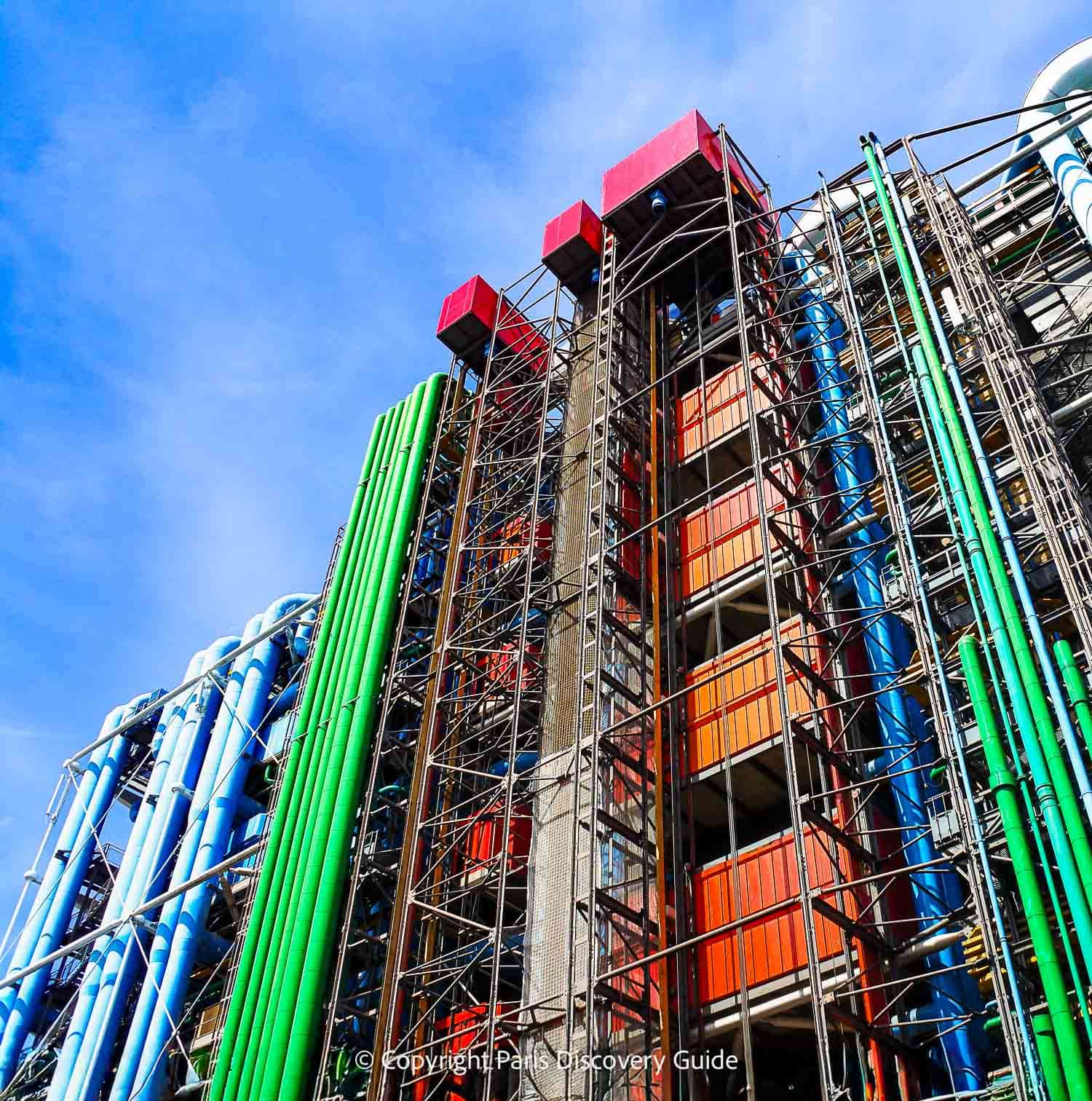
The 4th includes Île Saint-Louis, half of Île de la Cité, and a swath of the Right Bank, including part of the Marais, and is packed with top attractions, historical neighborhoods, chic shopping, and superb restaurants.
Discover: The magnificent Cathedral of Notre Dame on Île de la Cité. Bertillon ice cream, considered the best in Paris, in Île Saint-Louis.
Although Centre Pompidou, Paris's famous modern art museum is closed for major renovations until 2030. you may still be able to glimpse its mid-century modern "inside-out" architecture as you walk by.
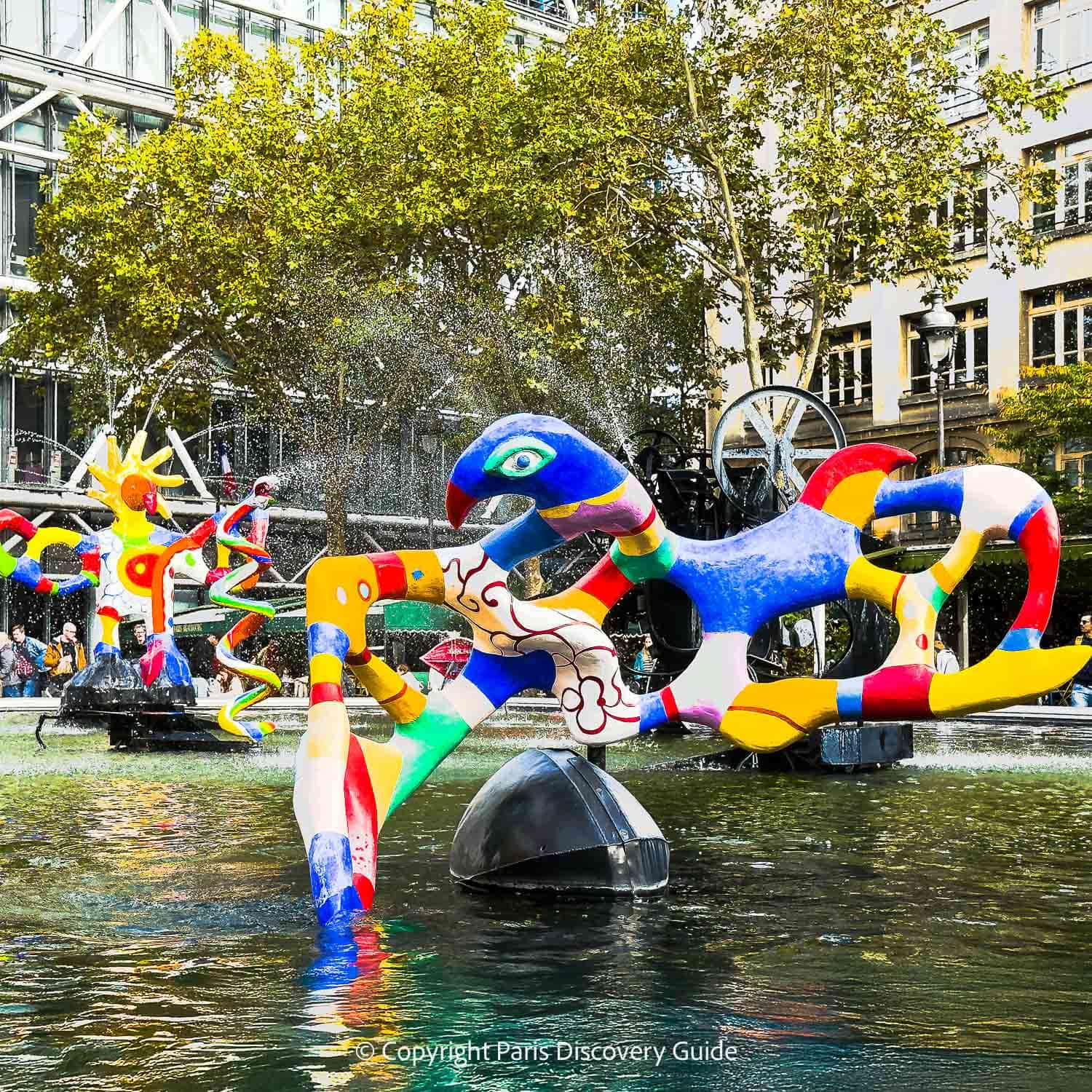
For another glimpse of modernism, head over to the quirky Stravinsky Fountain behind the museum, and also check out the nearby wall murals created by street artists.
Explore the trendy boutiques and galleries in the Marais, and visit antique stores and artisans in historical Village Saint-Paul.
Go for carryout falafel in Rue de Rosiers in the Marais home of the oldest Orthodox Jewish community in Paris, and picnic in picture-perfect Place des Vosges.
The Vibe: Trendy and lively
Fun Ways to See the Marais
- Le Marais District & Jewish Quarter Guided Walking Tour - On this small group tour with maximum 8 people, you'll see important attractions and beautiful parks, and explore the historical Jewish Quarter and its wonderful kosher restaurants and boutiques. Find out more
- Marais Walking Food Tour: Cheese, Wine, & Delicacies - You'll stroll around this charming neighborhood and see its many art galleries, boutiques, cafes, and centuries-old architecture as you stop at 8-10 places to sample cheese, wine, pastries, and seasonal specialties. This tour lasts 3+ hours. Find out more
- Marais Pastry & Chocolate Tour - You'll explore small streets and hidden nooks of the Marais while learning about the neighborhood, visiting chocolate shops and bakeries, and tasting some samples. Find out more
Best places to stay in the Marais
Where to stay in the Marais during winter months
Best Paris Arrondissements for Your Visit
Which district should you choose when choosing where to make hotel reservations or book an apartment for your Paris visit? Here's a quick guide:
Are you a . . .
- First-time (or return) visitor who wants to see top Paris attractions? Focus on these arrondissements: 1, 3, 4, 5, 6, 7, 8, 9, part of 16 (Trocadéro) and part of 18 (Montmartre)
- Return visitor who wants to explore the "real" Paris off the tourist path and discover hidden treasures? Explore these arrondissements: 2, 10, 11, 12, 13, 14, 15, 16 (beyond Trocadéro), 17, 18 (beyond Montmartre), 19, and 20
5th Arrondissement - Latin Quarter, Cluny Museum, Arènes de Lutèce, Panthéon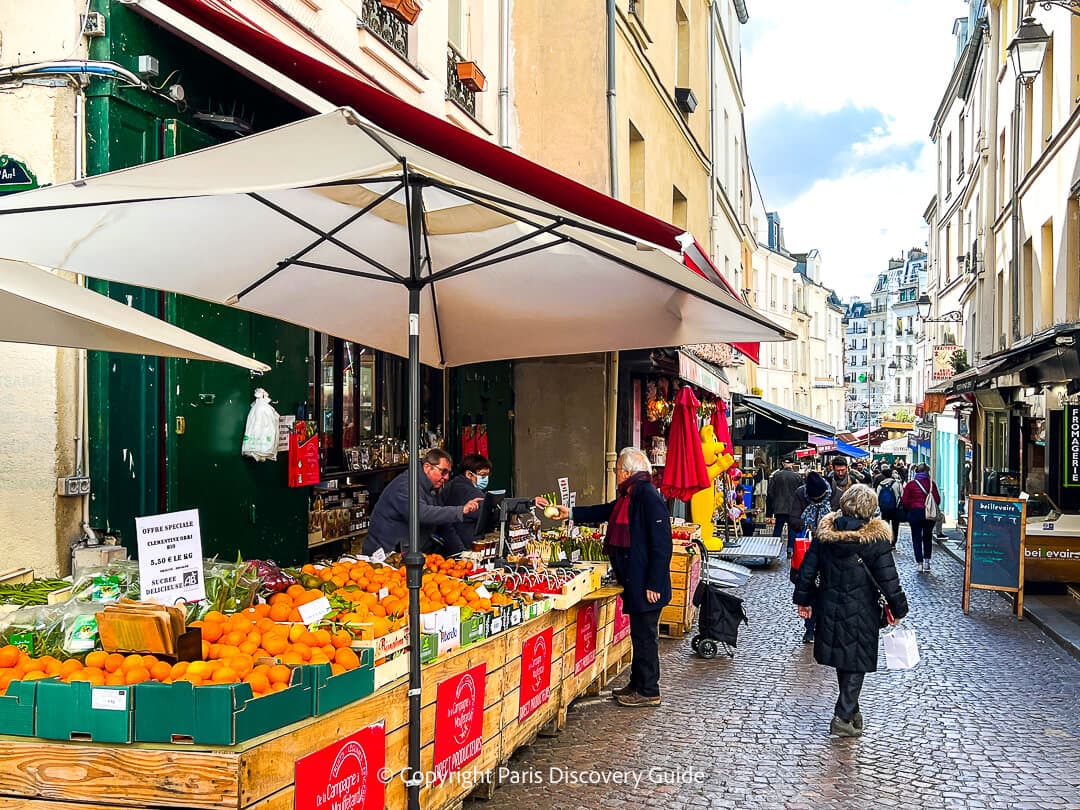
Why visit: Layers of history, the famous Latin Quarter and other top attractions, charming street markets, and winding cobblestone lanes make the 5th Arrondissement another "must-see" part of the city for first-time and returning visitors.
Top Attractions in the 5th Arrondissement
Discover: The famous Pantheon, towering majestically over much of the district
The Roman-era Arènes de Lutèce and Roman baths under Musée Cluny, home to magnificent tapestries and other medieval treasures.
The Jardin des Plants, where you'll find an ancient botanic garden, Natural History Museum, and the small but appealing Paris Zoo.
Don't miss the Rue Mouffetard street market, Shakespeare and Company Bookstore, and Tunisian pastries and tiny glasses of mint tea at the Arab Institute's terrace restaurant overlooking the most scenic parts of Paris.
The Vibe: Relaxed and still slightly bohemian, thanks to all the students in the area - although upscale in a low-keyed way
Find best hotels & apartments in the Latin Quarter
6th Arrondissement - Luxembourg Garden, Saint Germain des Prés, & Saint-Sulpice Church
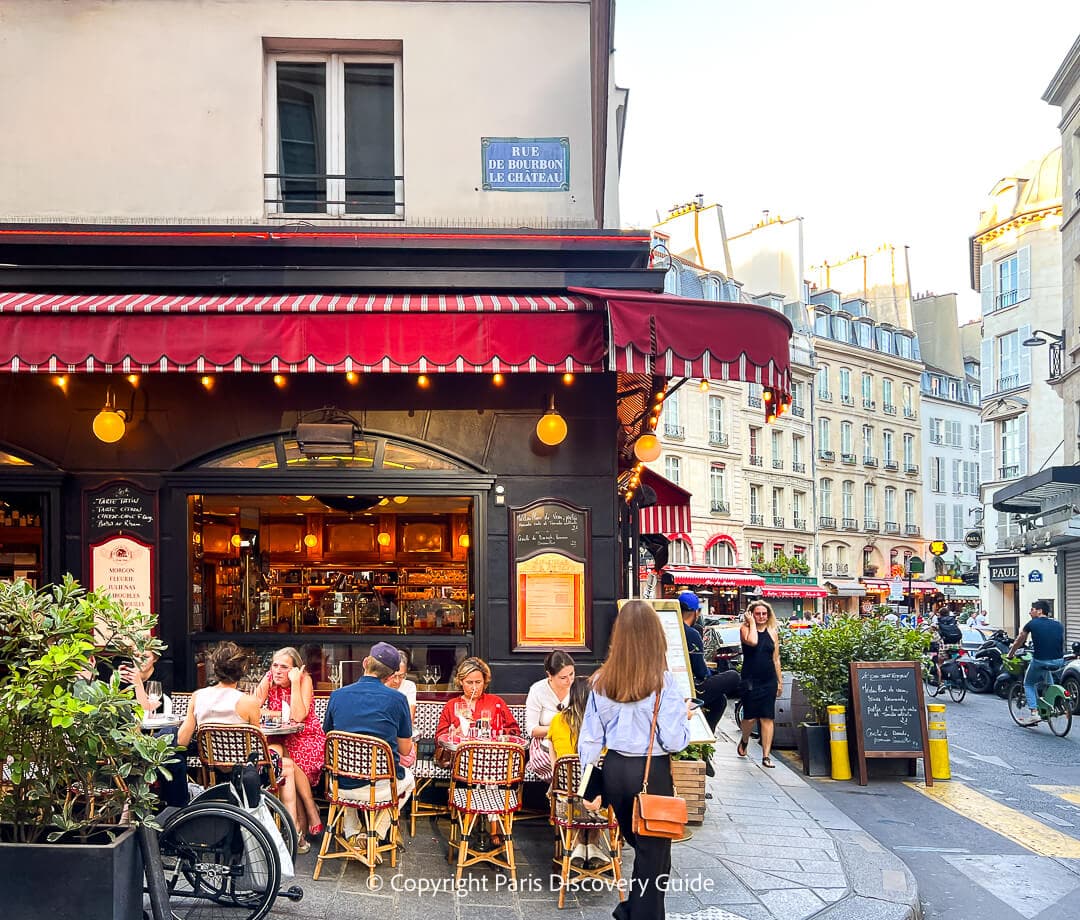
Why visit: The lovely 6th arrondissement, famous for its formerly bohemian Saint-Germain-des-Prés neighborhood and a slice of the chill Latin Quarter, is a lovely upper-class mostly-residential district with commercial areas devoted to superb boutiques, art galleries, and dining.
Top Attractions in the 6th Arrondissement
Discover: Beautiful Luxembourg Garden. Cafés and bistros along Boulevard Saint-Germain made famous by French Existentialists and American writers during the last century.
Visit: The magnificent Church of Saint-Sulpice, setting for The Da Vinci Code, and Paris's oldest church, Eglise Saint-Germain-des-Prés
Explore: The district's wonderful antique shops, home furnishing boutiques, and clothing stores.
Buy: Holiday gifts at the large Christmas market by Saint-Germain Church from mid-November through December
The Vibe: Reminiscent of a 19th century romantic painting of the city, a favorite of many American tourists
Recommended 6th Arrondissement Tours
- Saint-Germain Pastry & Chocolate Walking Tour - You'll sample pastries, chocolates, and breads on this walking tour through this posh Paris neighborhood
- Saint-Germain-des-Prés Private Tour - From famous cafes and churches to fantastic chocolate and pastry shops, your guide will customize this private tour to suit your interests
Where to Stay in the 6th Arrondissement
- Hotel Clémont - This charming 2-star boutique hotel with 28 guestrooms has air conditioning and an elevator, and serves a fantastic breakfast; great value near the Saint Germain Market and Saint Sulpice Church
- Hotel de Buci - This charming 24-room boutique hotel on the Rue Buci market street features furnishings with a romantic Louis XV 18th century très-Parisian vibe
- Hotel Madison - Lovely 4-star boutique hotel with 50 rooms and suites across from Saint Germain des Prés church in a fantastic location near two metro stations
- Hôtel Montalembert - Excellent 5-star boutique hotel in Saint Germain de Prés near museums, the Bon Marché luxury department store and food hall, and numerous small boutiques and antique shops
- Hotel de Seine (52 Rue de Seine) - This centrally-located small 3-star boutique hotel features 30 guestrooms, air conditioning, and an elevator in an excellent location near the Seine River
Find more hotels & apartments in the 6th arrondissement
Where to stay in Saint-Germain-des-Pres during winter months
7th Arrondissement - Eiffel Tower, Orsay Museum, Bon Marché, Champ de Mars
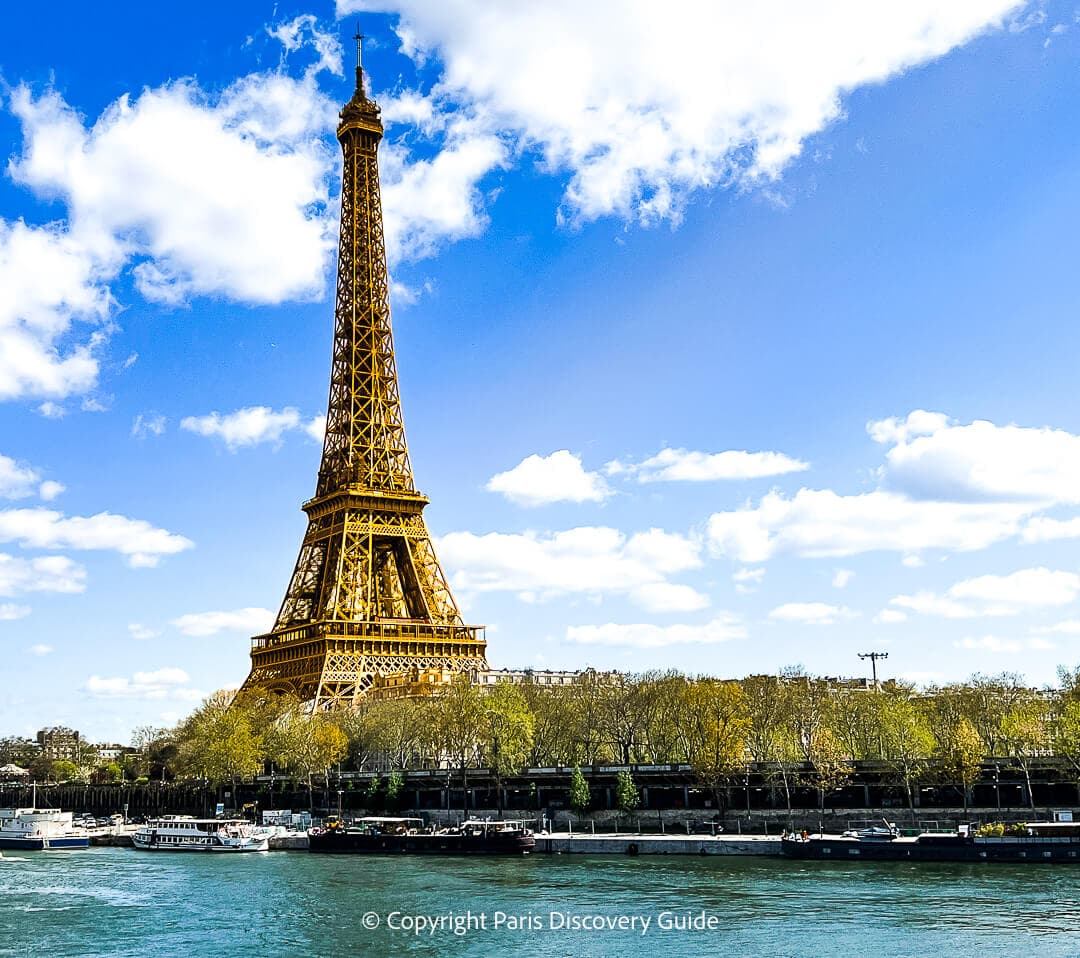
Why visit: The 7th arrondissement is where you'll find the world's most famous landmark - the Eiffel Tower - as well as several top museums, the only department store on the Left Bank, a popular market street, and many top-notch restaurants.
Top Attractions in the 7th District
Discover: Sweeping Paris views from the top of the Eiffel Tower.
Find out how to get skip-the-line-priority entrance to the Eiffel Tower
See Impressionist masterpieces at Musée d'Orsay, non-western art at the Branly Museum, and magnificent sculptures and a romantic garden at Musée Rodin.
Find skip-the-line tickets & guided tours to the Orsay Museum
Shop for luxury goods and gourmet food and wine selections at Le Bon Marché.
History buffs will want to explore Les Invalides, where you'll find the Musée de l'Armée and Napoleon's tomb in Dome Church (get a priority entrance ticket that covers both).
After your visit, walk a few blocks to reach the popular Rue Cler market street, overflowing with small cafes and yummy bakeries where you enjoy a wonderful lunch or dinner. Or buy a few gourmet goodies and head over to nearby Champ de Mars for a picnic.
The Vibe: Elegant, quiet, upscale (except for the tourist-packed area around the Eiffel Tower)
Where to Stay in the 7th Arrondissement
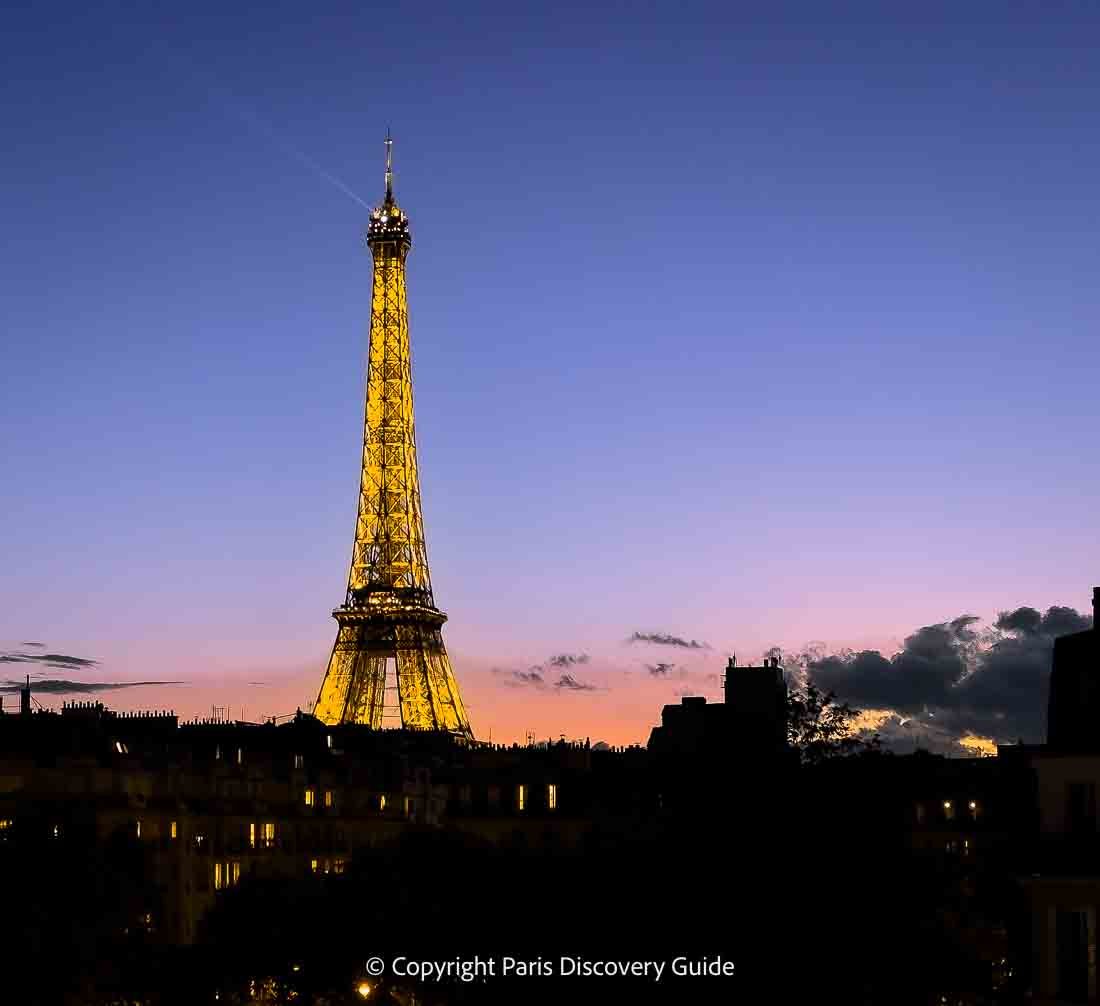
- Hotel La Comtesse - All 40 guest rooms in this 4-star hotel feature direct or side views of the Eiffel Tower; for an extra treat, book a room with a balcony
- Hotel du Cadran - 4-star hotel with 53 guestrooms just off of Rue Cler and about a 7-minute walk to the Eiffel Tower; rooms are small but nicely furnished with contemporary decor
- Hotel Montalembert - Top-rated 5-star boutique hotel near museums, the Bon Marché luxury department store, and numerous art galleries
- Cler Hotel - This 3-star hotel overlooks the Rue Cler market street and is a favorite of Rick Steves (and a lot of other people) due to its winning combination of comfort and affordability
- Hotel Eiffel Turenne - 3-star value hotel close to Rue Cler with air conditioning, a small elevator, and 34 attractive rooms; a couple have views of the top of the Eiffel Tower
Find more hotels near the Eiffel Tower
Best hotels in Paris's 7th arrondissement
8th Arrondissement - Arc de Triomphe, Champs-Élysées, Golden Triangle, Parc Monceau
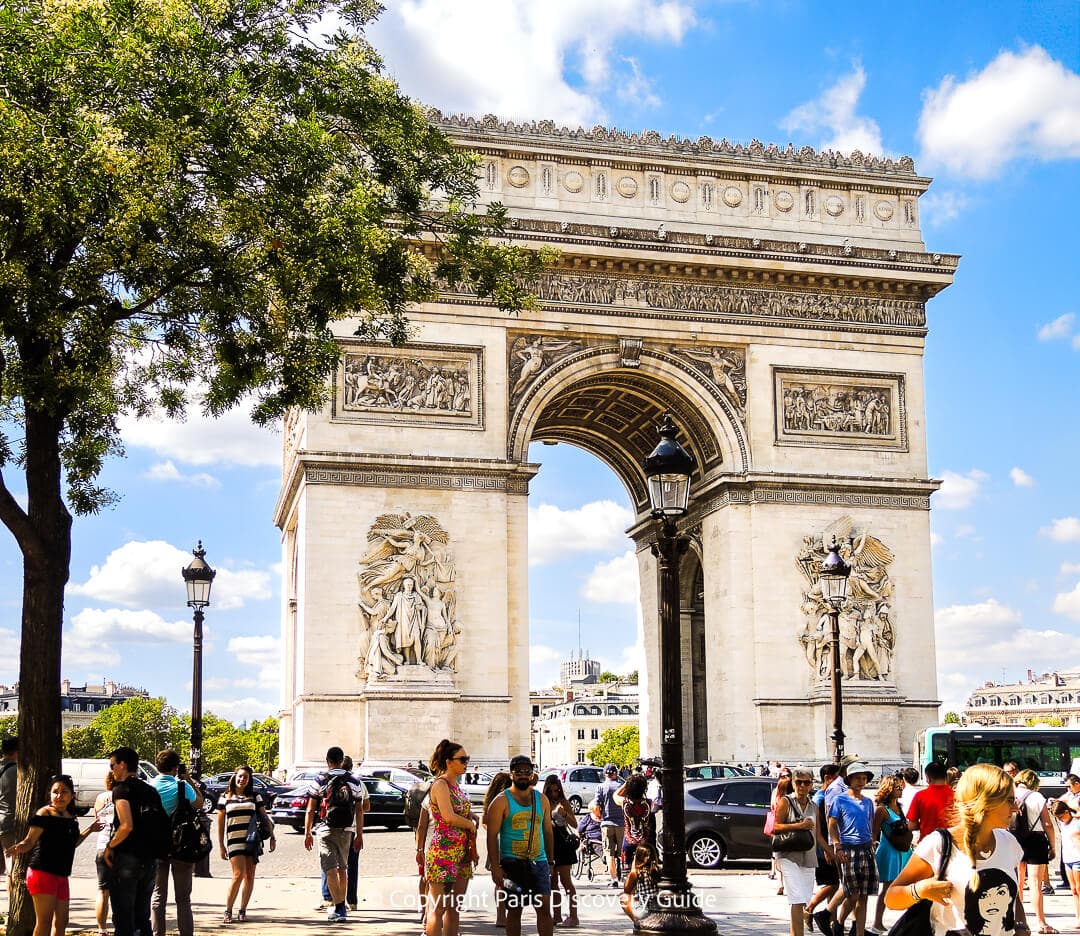
Why visit: With the Arc de Triomphe and Champs Élysées as major tourist attractions, the 8th arrondissement ranks high on the "must visit" list for most first time visitors. But there's so much to see and do here that you'll want to return whenever you're in Paris.
Top Attractions in the 8th Arrondissement
Discover: Expansive views from the top of the Arc, the beautiful but blood-soaked Place de la Concorde, and an eternal flame marking the Tomb of the Unknown Soldier at the base. Excellent art collections, exquisite architecture, and a little-known tea room overlooking a lovely garden at the Petit Palais. Special exhibits at the enormous glass-roofed Grand Palais. Luxury goods on display in designer showrooms along the Golden Triangle.
Need a change of pace in this wealthy, tourist-filled arrondissement?
Head over to tranquil Parc Monceau, and visit one of the nearby specialty museums - Musée Cernuschi, Musée Nissim de Camondo, or Musée Jacquemart-André.
Fun Things to Do in the 8th Arrondissement
- View Paris from the top of the Arc de Triomphe - You'll experience panoramic views of the entire city and all its iconic sites. That's where we took the photo of Sacre Coeur at the top of this page. Tickets are cheap - but admission lines can be long, so do yourself a favor and get a skip-the-line ticket online before you go.
Find out more about visiting the Arc de Triomphe
Best places to stay in the 8th arrondissement
Fun Ways to See & Do near the Arc de Triomphe
9th Arrondissement - Palais Garnier, Pigalle, Galeries Lafayette, Printemps, Wax Museum, Covered Passages
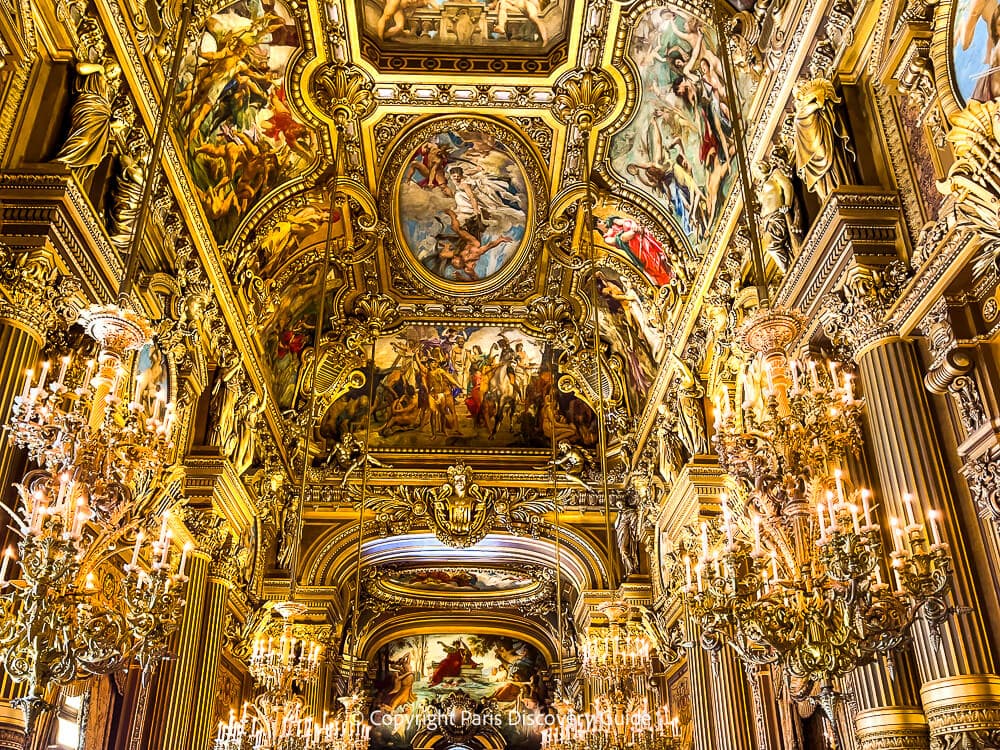
Why visit: For most tourists, the top reason to visit the 9th arrondissement is shopping at the Grands Magasins (big luxury department stores) - Galeries Lafayette and Au Printemps - in this lively district filled with gorgeous19th century Haussmannian architecture.
Top Attractions in the 9th Arrondissement
More to discover:
- The spectacular Opéra Garnier (Paris Opera) - the largest and possibly the most flamboyant opera house in Europe, and a must-visit destination for Phantom of the Opera fans.
Explore the Paris Opera House, a Baroque masterpiece
- Musée Grévin, the wax museum, located in Passage Jouffroy, one of the many historical covered arcades in the 9th.
Get your Grevin Museum tickets online and skip the (usually) long ticket queue at the entrance
If you enjoy exploring newly hip neighborhoods, head to trendy South Pigalle, known as SoPi where you can visit the Musée de la Vie Romantic (but do know that SoPi's northern edge bordering the 18th can still feel a bit sketchy due to the remaining sex shows in this former red-light district, although in reality it's quite safe).
Stop by the famous Drouot auction house, and explore the surrounding streets where you'll find many dealers specializing in stamps, coins, antiques, and other collectibles.
9th Arrondissement Complete Guide: Find more things to do & see
Where to stay in the 9th arrondissement
Best places to stay in the 9th during winter months
10th Arrondissement - Canal Saint-Martin, Place de la République, Gare du Nord, Gare de l'Est
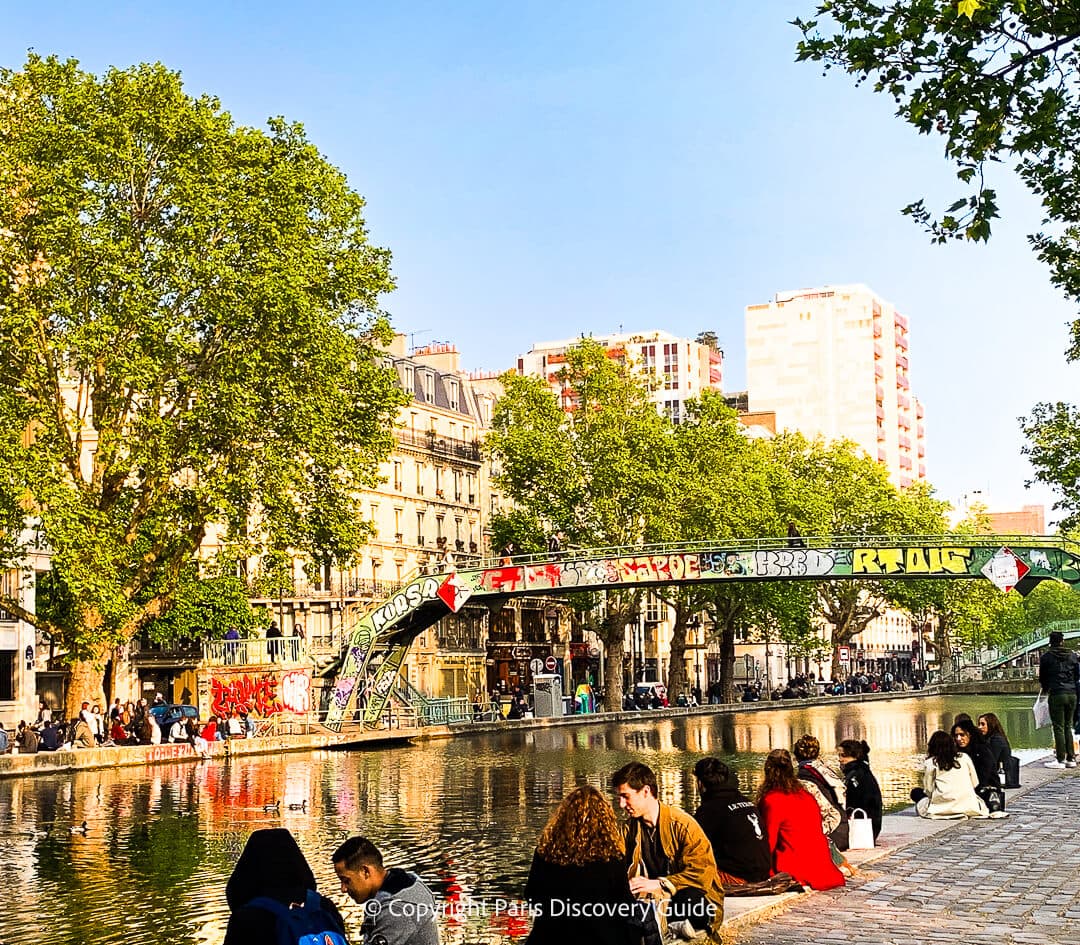
Why visit: The diverse 10th arrondissement contains two major Paris train stations, Gare du Nord and Gare de l'Ést, surrounded by numerous popular bistros and cafes, and a variety of neighborhoods - some more gentrified (which means more hotels, etc) than others.
What to Discover: Scenic bridges and locks along Canal Saint-Martin - Take a cruise, or simply stroll around the neighborhood and enjoy the colorful street art, lively cafes, and boutiques - in particular, look for up-and-coming young designers and pop-up stores.
Place de la République (shared with 11th) - another trendy spot filled with bars and bistros, nightlife, and towering over the square, a magnificent statue of Marianne, Goddess of Liberty and symbol of the French Republic.
Where to stay in the 10th arrondissement
11th Arrondissement - Place de la Bastille, Oberkampf, Nightlife, Atelier des Lumieres
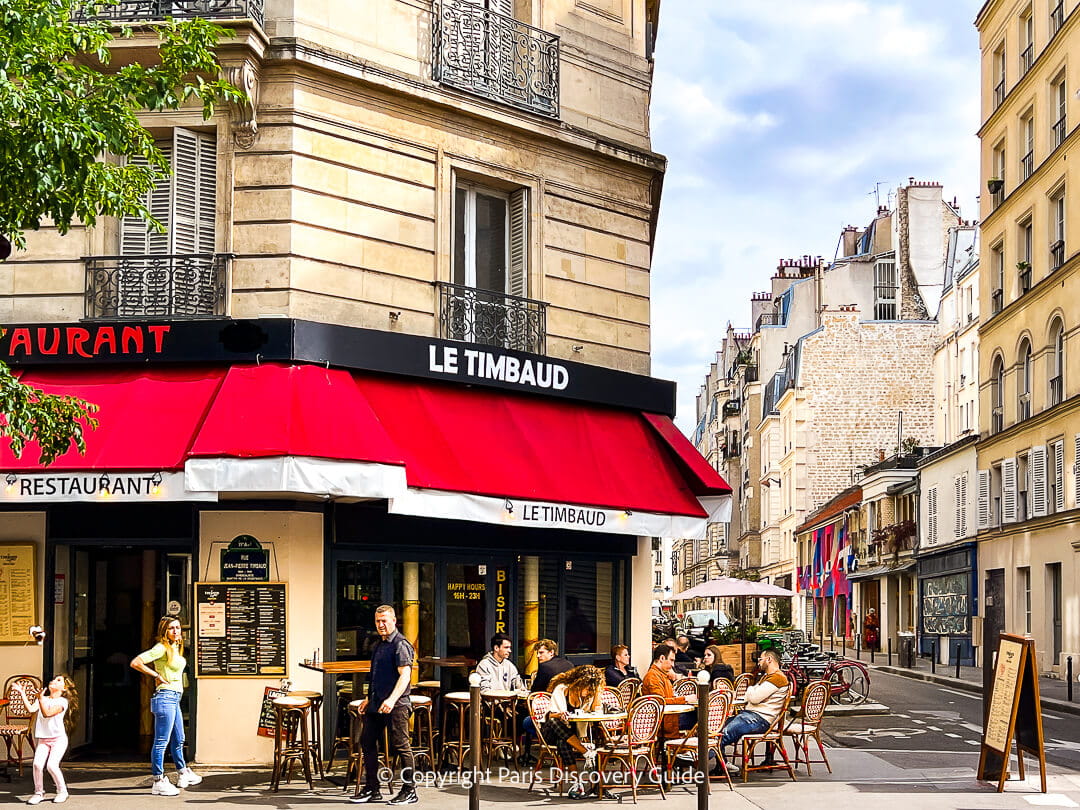
Why visit: The 11th arrondissement is a pleasant, mostly-residential area, formerly working class but now trendy and increasingly gentrified. Major landmarks and attractions include Place de la Bastille and the enormous Opéra Bastille where you can catch a Paris Opera concert or ballet.
Head to the 11th's hip Oberkampf neighborhood to explore small, locally-owned art galleries, quirky boutiques, and Atelier des Lumières where you can enjoy immersive digitized art and music shows in a former iron foundry.
Oberkampf is also the center of a lively nightlife centered around bars, clubs, and the Bataclan concert venue, which has hosted some of the top rock musicians of the past 50 years including Iron Maiden, Lou Reed and the Velvet Underground, Peter Gabriel and Genesis, Prince, the Clash, Jeff Buckley, and Sting.
The 11th also includes a corner of the Belleville neighborhood, home to many emerging artists and a lively food scene - although that's also true of the 11th in general.
Discover: Cafes with expansive outdoor terraces around and near Place de la Bastille. Vintage furniture and indie designer clothing stores around Rue de Marché Popincourt and Rue Nueve Popincourt.
The Bastille Arts and Crafts Market held from 9am - about 6pm every Saturday along Boulevard Richard Lenoir, starts just beyond the Bastille Métro Station.
If you are adventurous, explore the almost-hidden passages and interior courtyards along the north side of Rue du Faubourg Saint-Antoine, once occupied by 19th century furniture makers and artisans, and now art galleries, craft studios, and boutiques.
Stay: An increasing number of appealing hotels, including several chic 4-stars and most recently, a couple of top-rated 5-stars, have opened in the 11th during the past decade, offering attractive budget-friendly rates compared with the more touristic single-digit arrondissements.
12th Arrondissement - Proménade Plantée, Marché d'Aligre Market, Bercy Village, Bois de Vincennes
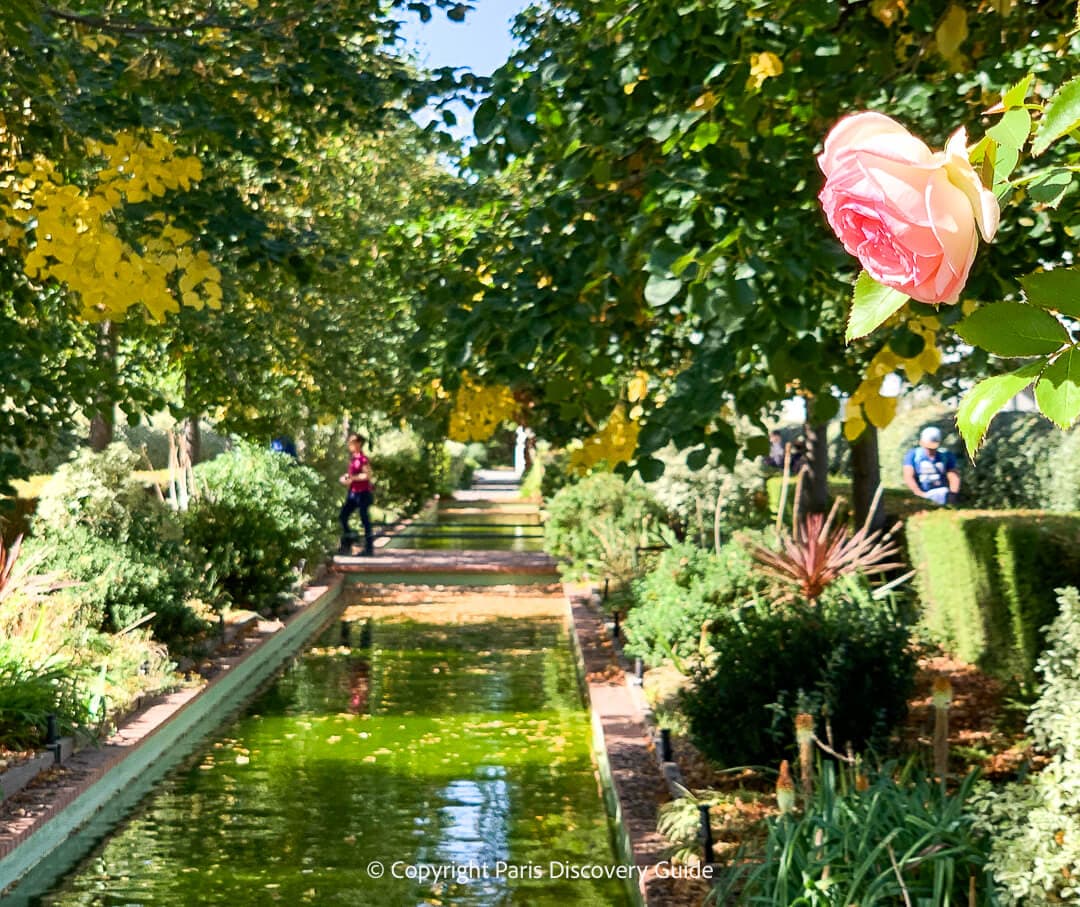
Why visit: Although the 12th arrondissement is primarily residential, it has several attractions worth exploring if you're on a return visit to Paris and want to interesting sites beyond the major tourist attractions. On the 12th's eastern side is the largest public park in Paris, Bois de Vincennes, complete with a medieval castle, English-style gardens, and a large zoo.
Discover: Interesting city views and exquisite gardens along the elevated parkland of the Coulée Vert. Thrilling ballet performances at the glittering Bastille Opera. Treasures (and junk) at the Marché d'Aligre, the city's most popular flea market. Spend an afternoon browsing in the boutiques and sipping wine at an outdoor cafe in Bercy Village, converted from 19th century wine warehouses next to the Seine. Chill at Ground Control, a new food and entertainment center.
Find best places to stay in the 12th arrondissement
Paris Arrondissement Numbers: 4 Ways You Can Use Them
- Avoid getting lost: Most street signs display the arrondissement number - an easy way to confirm roughly where you are.
- Find your destination's location: Not sure where you're going? Look up the address, which almost always include a 5-digit postal code. The code's last two digits are the arrondissement number, which tells you where your destination is located. For example, if you look up the address for the Picasso Museum, you'll see the street address plus the postal code: 75004. That means the museum is in Paris's 4th district. (Paris addresses always have "75" as the first two digits.)
- Plan your trip: Do you have a bucket list of attractions and places you want to visit? Look up their addresses, note the district numbers, and plan your itinerary based on locations to minimize your travel time between attractions.
- Choose where to book accommodations: Once you identify the arrondissement where most of your bucket list attractions are located, choose a hotel or apartment in the same district for ultimate convenience.
13th Arrondissement - Gobelins Tapestry, Place d'Italie, Street Art, Butte aux Cailles
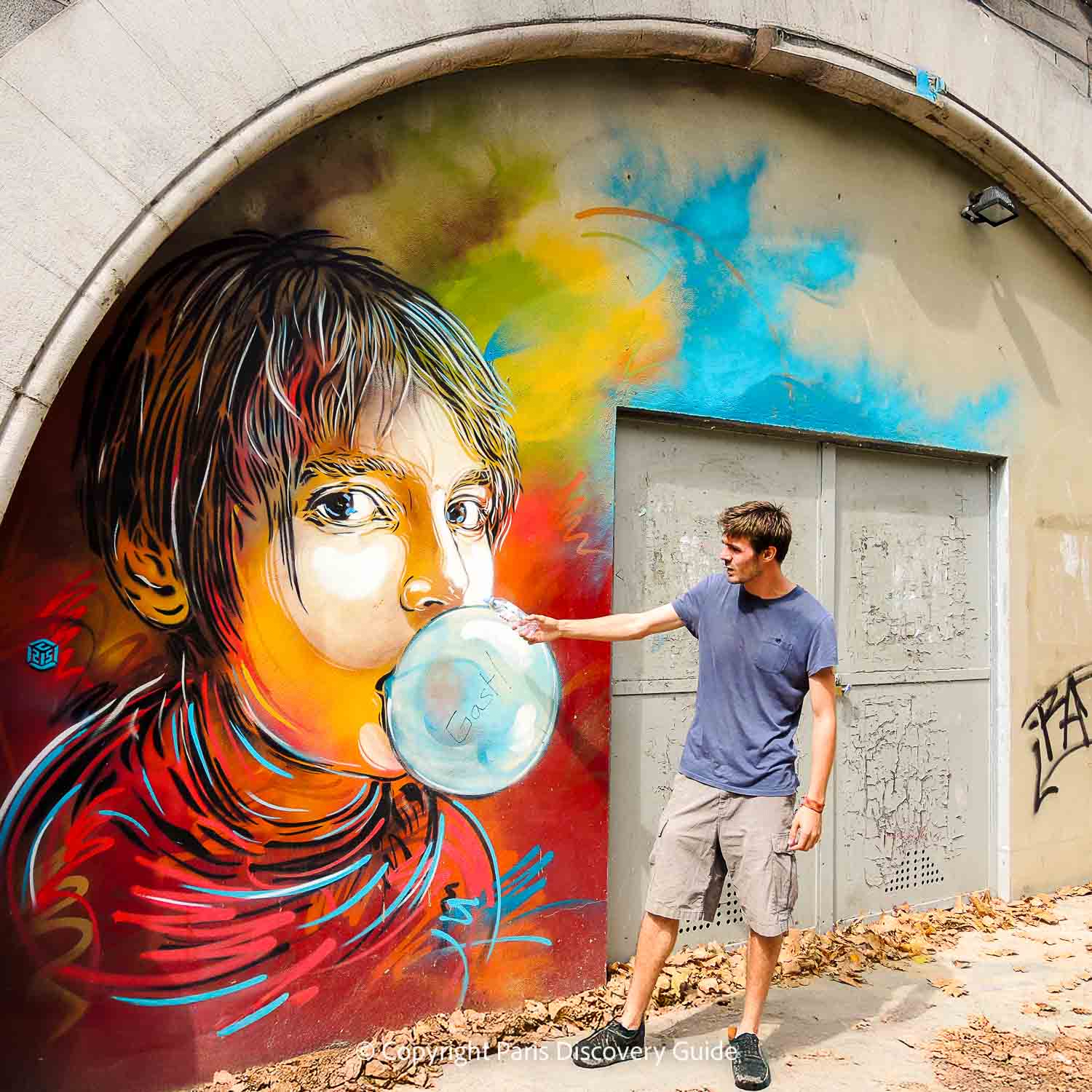
Why visit: Fans of street art will find plenty to enjoy in the 13th arrondissement, where an innovative mayor and many modern concrete high-rise buildings provide a welcoming canvas space for street art professionals and amateurs. Otherwise, this is another mostly residential neighborhood - no major tourist attractions, but plenty of interesting local spots to explore.
Discover: How tapestries are made at Gobelins Manufactory, creators of museum-worthy pieces since the mid-1400s. A large enclosed shopping mall - a rarity in Paris - in Place d'Italie. Charming leafy streets in the hilly Butte aux Cailles neighborhood. And of course, look for street art - some discrete, some mammoth - wherever you go in the 13th.
How to Explore:
Street Art at La Butte-aux-Cailles - You'll see a lot of exciting street art including some by internationally famous graffiti artists in this fascinating tour of the 13th arrondissement's village-like Butte-aux-Cailles neighborhood - Find out more & book your ticket
Street Art Open-Air Museum Bike Tour - Bike past giant street-art murals, admire the work of famous street artists, and explore the art in Paris' most modern neighborhood which most visitors and tourists never discover - Find out more & book your ticket
14th Arrondissement - The Catacombs, Montparnasse Cemetery, Musée de la Liberation

Why visit: The 14th arrondissement offers an interesting mix of commercial and residential areas, with plenty of cultural and historical attractions worth seeing, including the always-popular Paris Catacombs.
Discover: A maze of underground tunnels where the remains of about 6 million people are buried in the Catacombs. The tombs of famous artists, writers, and performers in Montparnasse Cemetery. Lots of theaters, restaurants , and several famous bistros in the area around the triangle formed by the Montparnasse-Bienvenue, Edgar Quinet, and Vavin Métro Stations.
Find out why & how to get skip the line priority tickets for the Catacombs
See all the Skip the Line and Priority Access ticket choices for the Catacombs
Must-visit destination for history buffs: Musée de la Liberation, a museum that examines the history of the French Resistance and the Liberation of Paris from the Nazis during World War II by focusing on heroic actions of individuals.
Next to the 14th, on the other side of the Périphérique: Vanves Flea Market
15th Arrondissement - Parc André Citroen, Montparnasse Tower, Beaugrenelle Mall
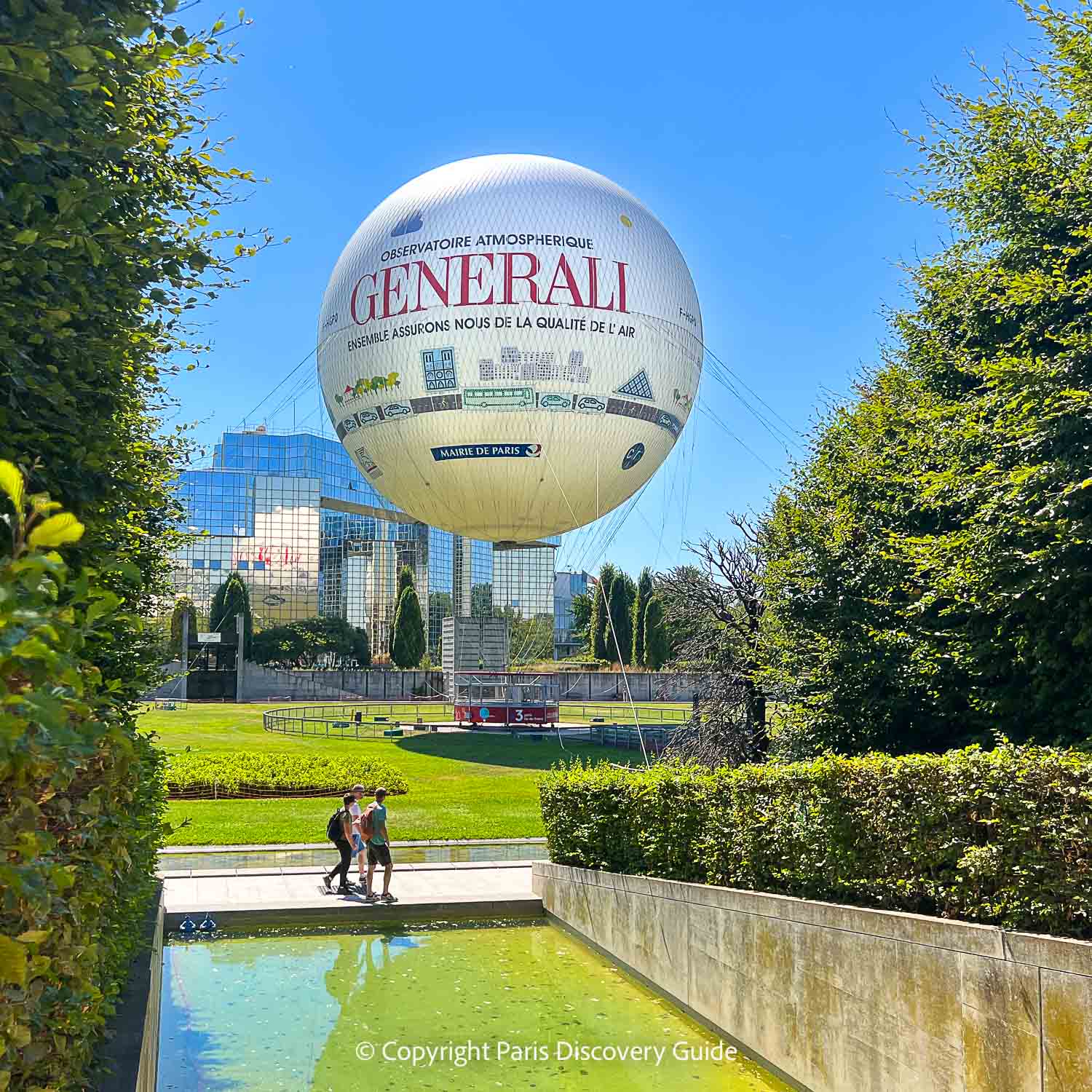
Why visit: The 15th arrondissement is a large, mostly residential middle-to-upper income district with lovely parks, a spectacular shopping mall, and easy access to Île-des-Cygnes (Island of the Swans), an almost-hidden park in the middle of the Seine. Visit the 15th to get a feel for how real Parisians live and play.
Discover: Hot air balloon rides at Parc André Citroen. Spectacular views of Paris from on top of Montparnasse Tower. The weekend antiquarian and used book market at Parc Georges Brassens. A collection of top clothing and specialty stores in the upscale Beaugrenelle shopping mall.
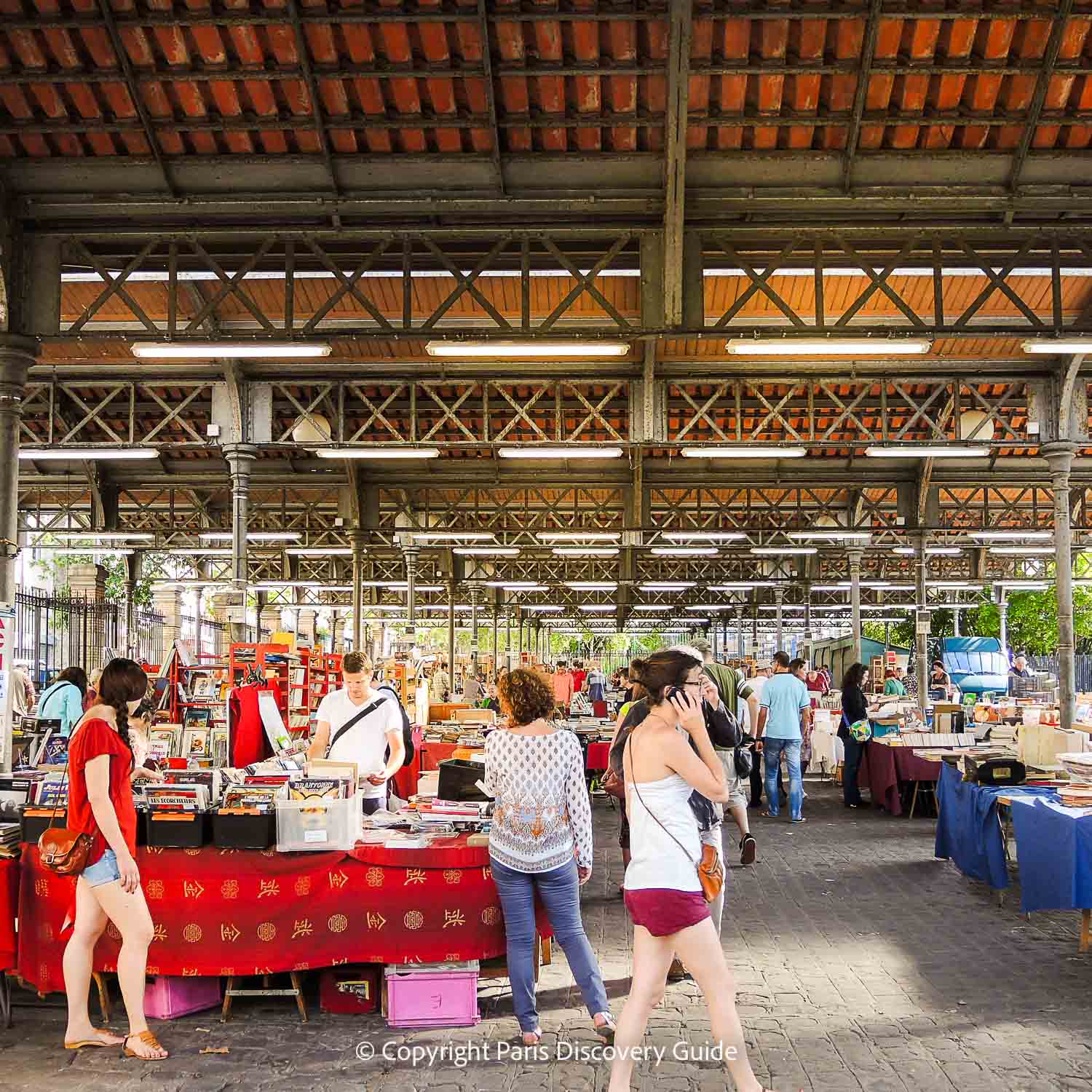
For the perfect afternoon, head to the Mirabeau Bridge and walk down the ramp to Île-des-Cygnes, a lovely sliver of an island in the Seine with excellent views of the Eiffel Tower.
Find out where to stay in the 15th district
16th Arrondissement - Trocadéro, Palais de Tokyo, Musée Marmottan, Bois de Boulogne, Paris Aquarium
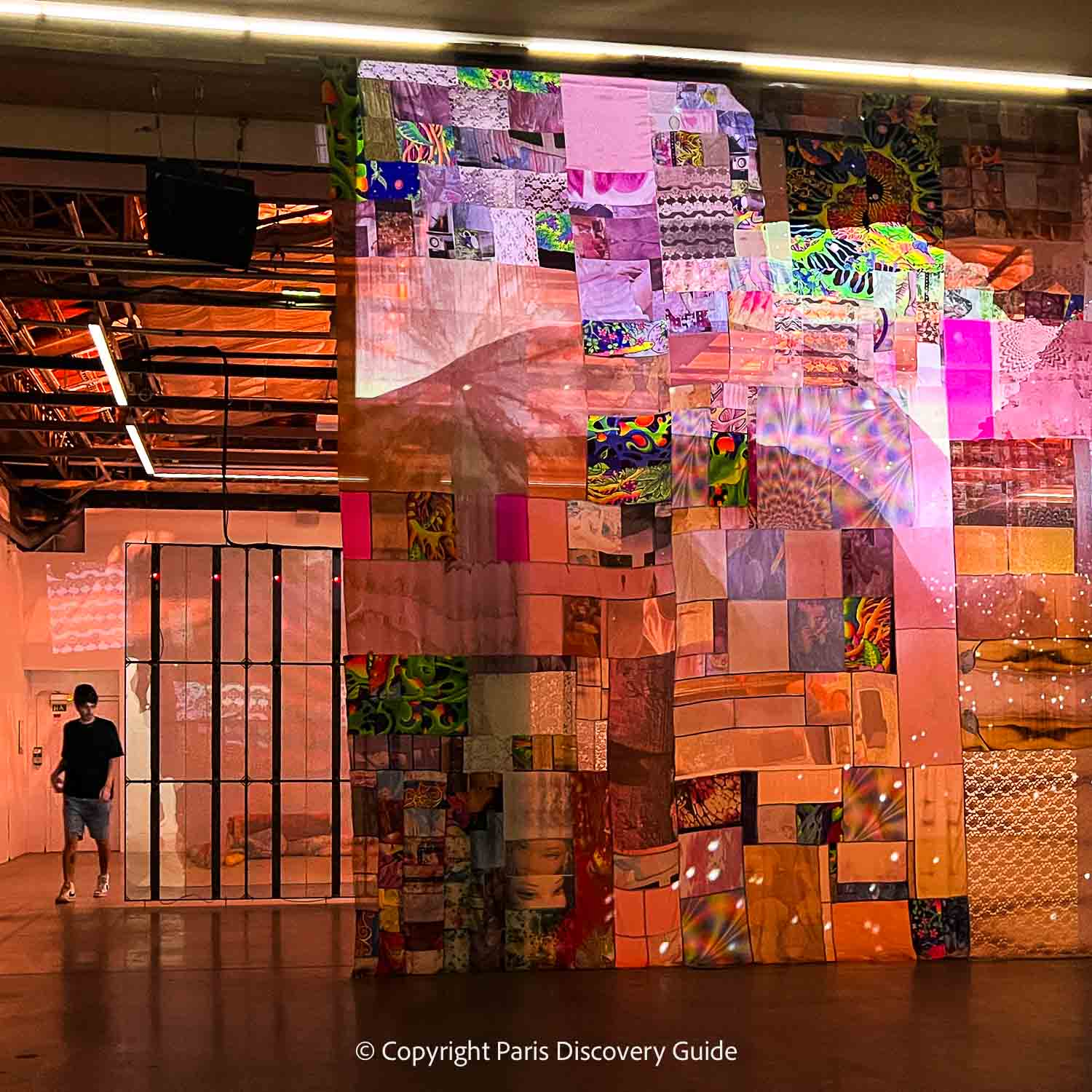
Why visit: Although much of the 16th arrondissement is a wealthy residential area (a favorite of well-off American ex-pats), numerous superb museums, excellent Eiffel Tower views, and the huge Bois de Boulogne park give you plenty of reasons to visit.
Discover: Unobstructed views of the Eiffel Tower from the marble-paved platform at Trocadéro.
A large collection of Impressionist and Post-Impressionist paintings by Claude Monet at Musée Marmottan.
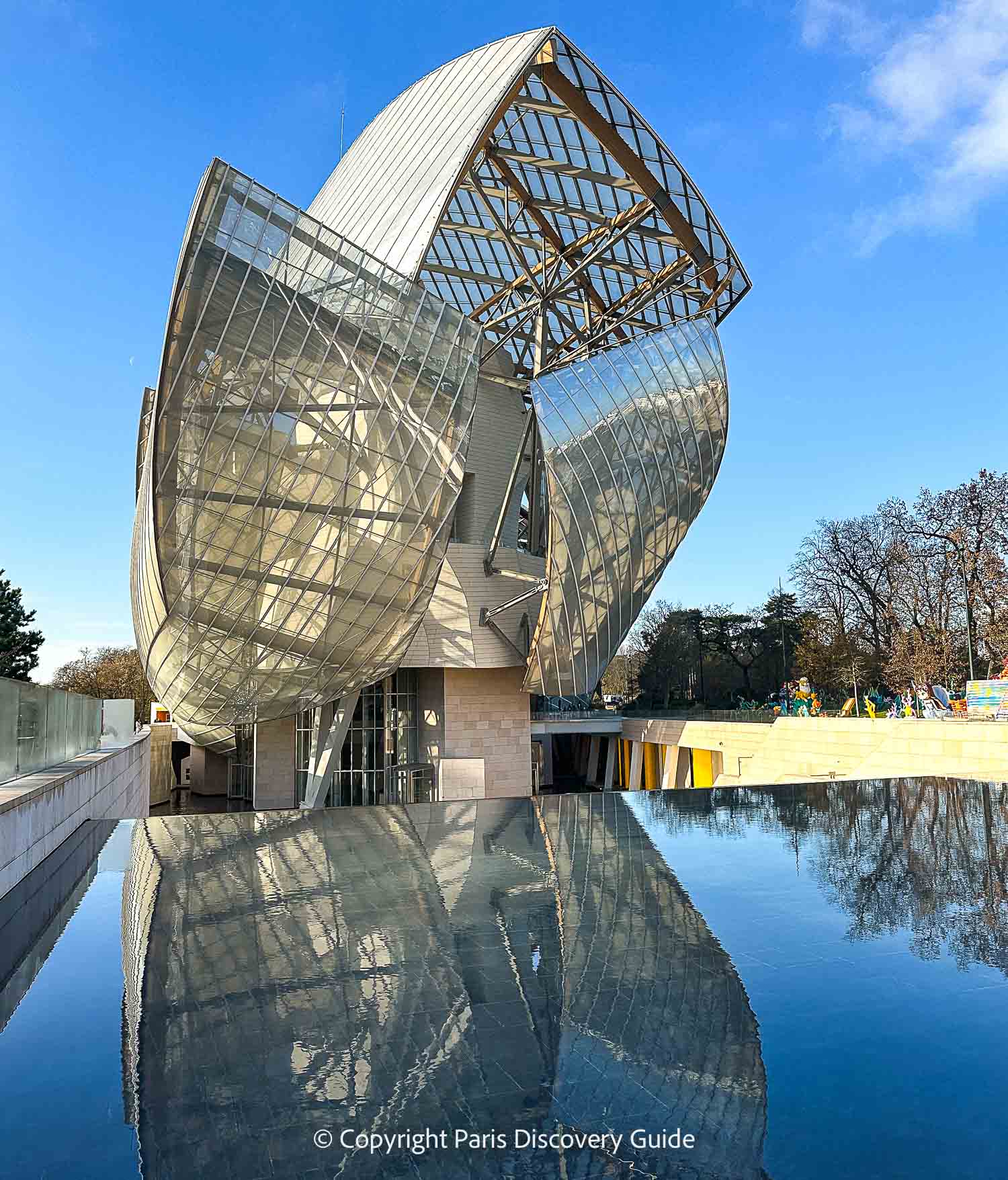
The French Open, Fondation Louis Vuitton, a chateau and lake, a zoo, and greenhouses containing 100,000 plants in the Bois de Boulogne park.
You could easily spend days exploring treasures in the 16th's many specialty museums - anthropology at Musée de l'Homme, avant-garde contemporary art at Palais de Tokyo, Asian art at Musée Guimet, fashion at Musée Galliera, 20th century masterpieces at Musée d'Art Moderne, and the world of counterfeiting at Musée de la Contrefaçon, to name just a few.
And if you're visiting Paris with kids, the Paris Aquarium will be a big hit.
Find recommended hotels in Paris's 16th arrondissement
17th Arrondissement - Batignolles Neighborhood, Rue Levis Street Market, Parc Martin Luther King-Clichy
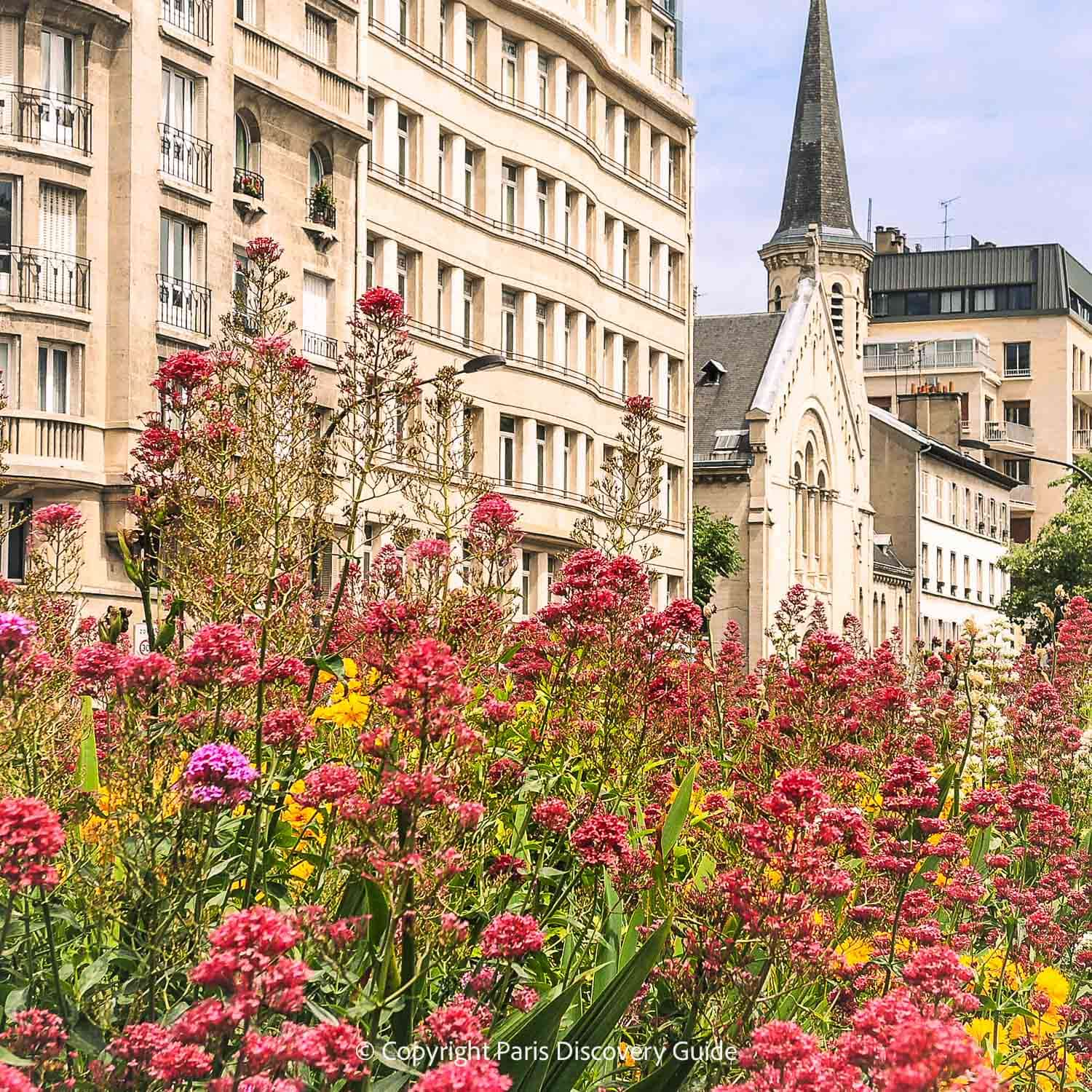
Why visit: The 17th Arrondissement's economic diversity makes it hard to categorize, and because it lacks any major tourist attractions aside from the Arc de Triomphe (which it shares with the 8th and 16th) and possibly the dazzling new Economics Museum (Citéco/Cité de l'Économie), you might easily skip over it on your first, second, or even third trip to Paris.
But if you want to explore the "real" Paris, head to the leafy Batignolles neighborhood in the eastern part of the 17th, where you'll find a mix of 19th century charm and 21st century modernization.
Discover: Gourmet treats from all over France and freshly harvested organic produce in the Batignolles outdoor markets, including the wonderful Rue de Levis food street.
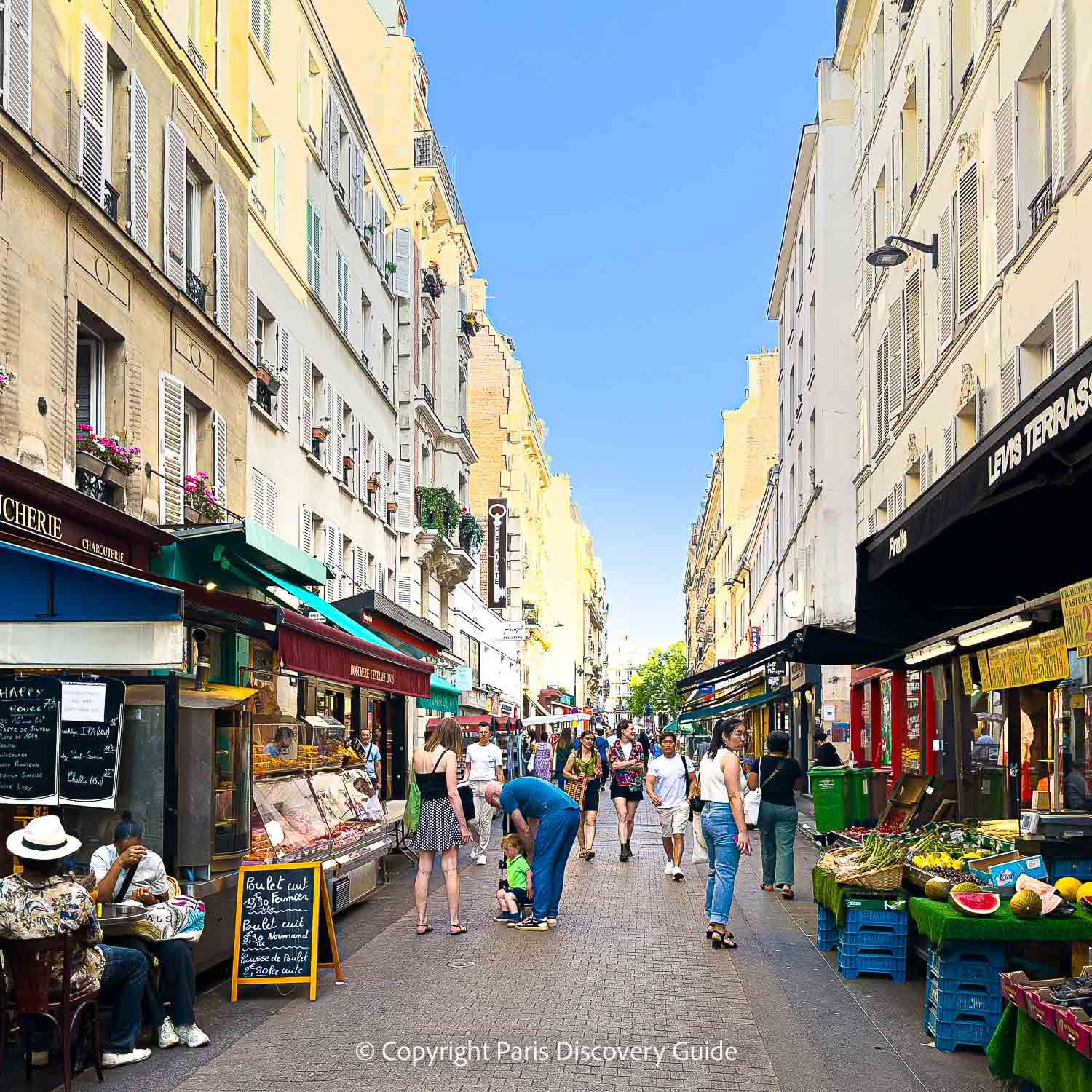
Charming sidewalk cafes lead up to Batignolles Square, a neighborhood park filled with landscaped hills and dells, a duck pond, and pétanque courts.
On the other side is Parc Clichy-Batignolles, a gorgeous new recreational area once occupied by freight yards, where you'll find beautiful ponds with ducks, a skate park, basketball courts, and a playgound surrounded by natural landscaping, scenic walks, and comfortable seating for relaxing and enjoy the views.
Find the best places to stay in the 17th arrondissement
18th Arrondissement - Montmartre, Sacré Coeur, Moulin Rouge, Les Puces Flea Market
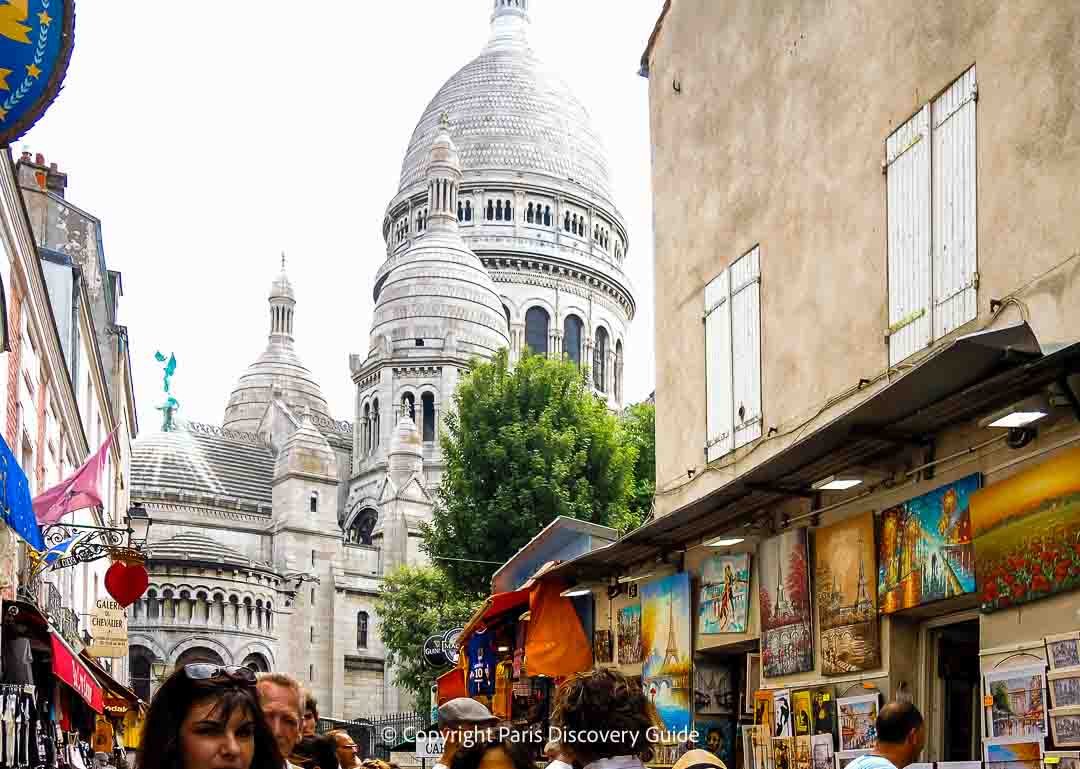
Why visit: Famous attractions, village-like neighborhoods once populated by artists and writers, and fantastic views of Paris attract large numbers of visitors to the 18th Arrondissement. You'll also find plenty of appealing cafes and boutiques, especially along Rue des Abbesses where a festive Christmas Market pops up during December.
Top Montmartre Attractions
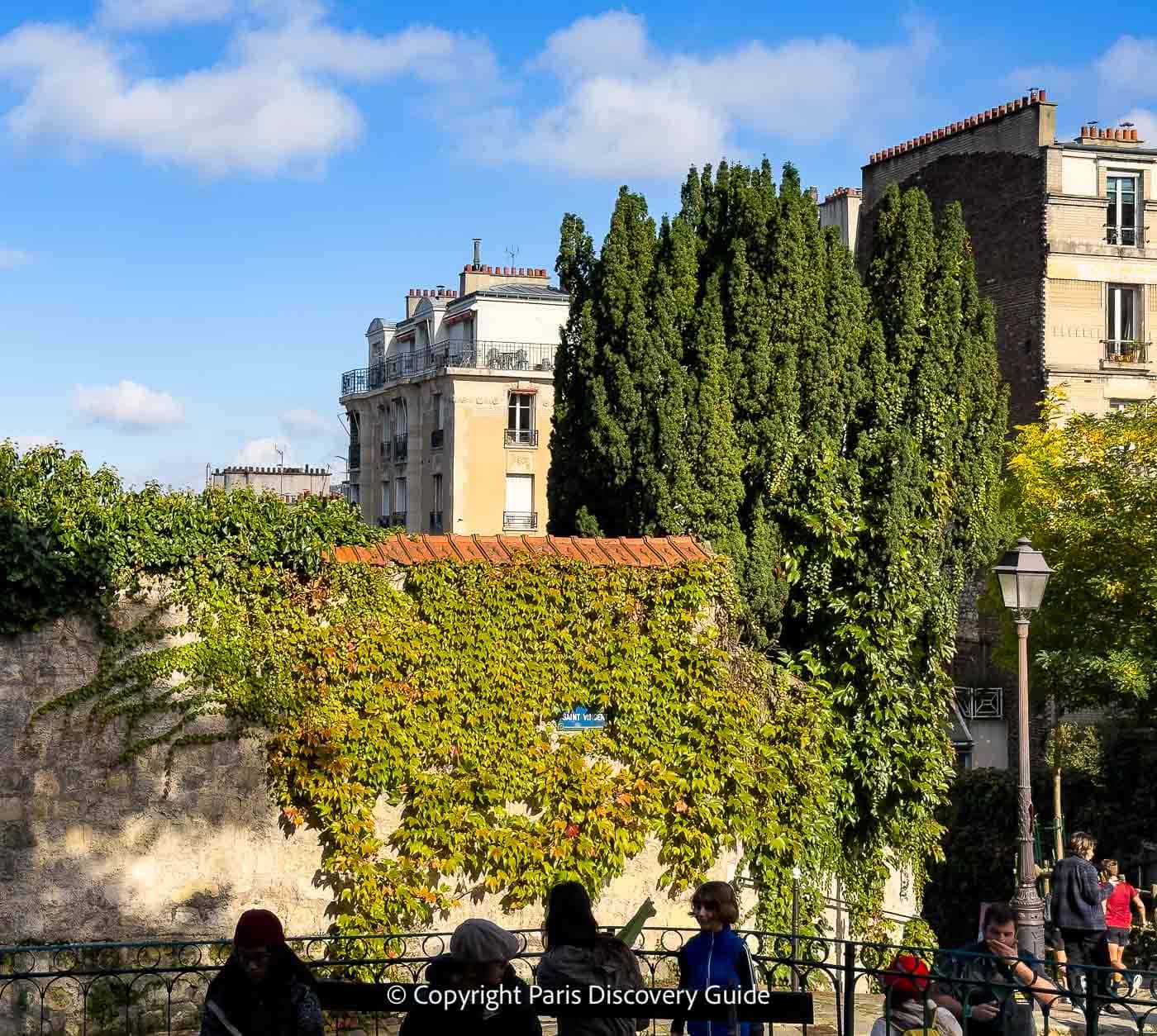
Discover: The sloping hills, vineyard, and stories about famous artists and musicians who once lived in Montmartre. The charming village of Abbesses. The picturesque views you stumble upon when you least expect them.
Enjoy: Spectacular views from Sacre Coeur, and many other spots in Montmartre.
Treat yourself to: Unforgettable shows and dinner at Moulin Rouge.
Explore: Five floors of dazzling textiles and trims at the Saint-Pierre Fabric Market.
Spend a day at: The biggest flea market in Paris (and the world), Marché aux Puces (Flea Market) in Saint-Ouen located just north of the Peripherique at Clingancourt. And no, Saint-Ouen is not part of Paris (historically, this was to avoid taxes) and Les Puces isn't technically in the 18th - but it's just across the city line, so don't miss it!
Find top Montmartre hotels & apartments in Montmartre
Recommended Montmartre Tours
19th Arrondissement - Parc de la Villette, Buttes Chaumont Park, Paris Plages
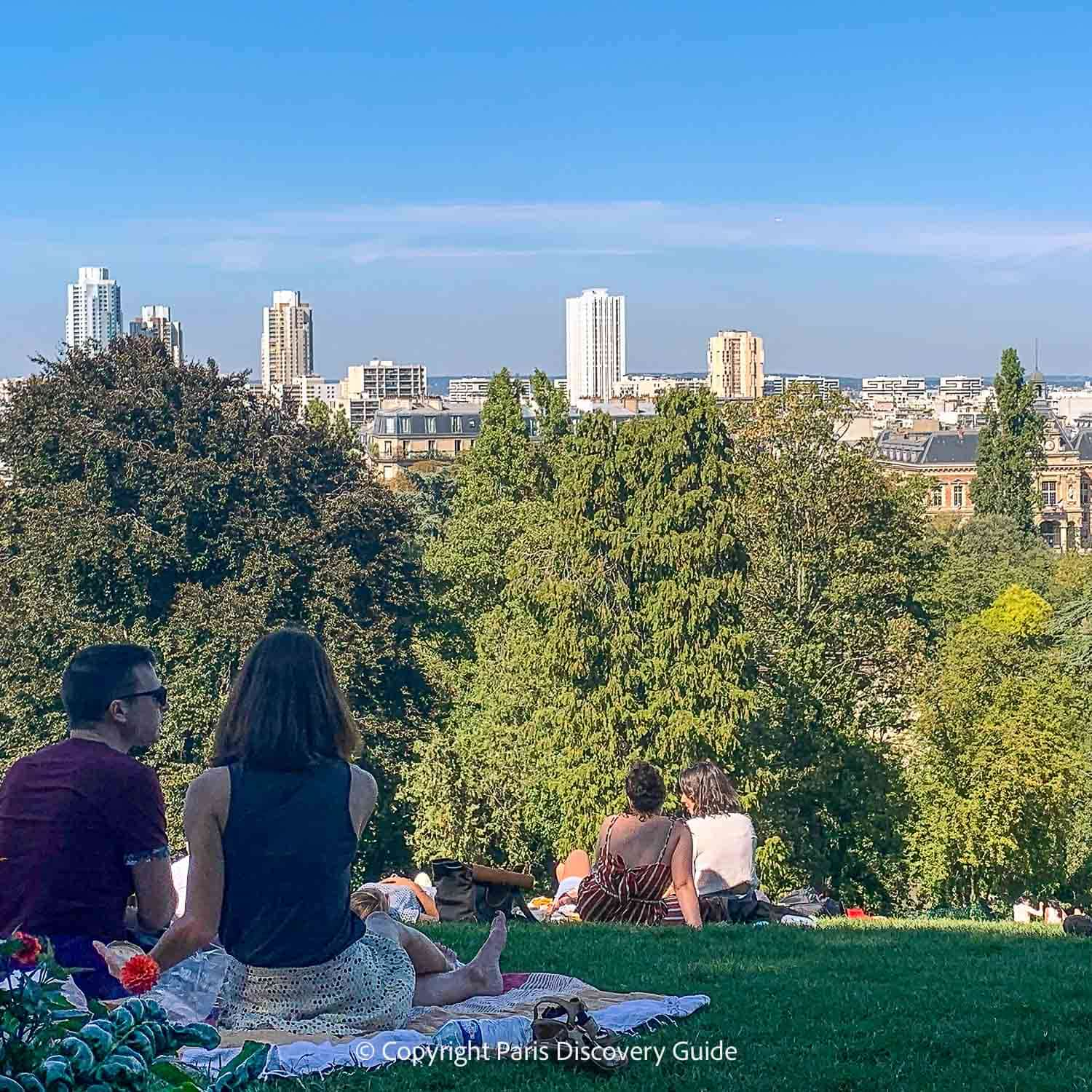
Why visit: Cultural, recreational, and scenic attractions fill the 19th Arrondissement's two huge parks - plus the district boasts the city's largest artificial lake, the site of summer festivals, sports, and even a "beach."
Discover: Cité de la Science et l’Industrie science museum, Cité de la Musique music instruments museum, and Philharmonie de Paris concert hall at Parc de la Villette.
Enjoy: Bassin de la Villette's beach and row boats during Paris Plages. Flower-covered slopes, a waterfall, and some of the best views of Paris in Parc des Buttes-Chaumont.
Find out about the 17 best locations to see spectacular Paris skyline views
20th Arrondissement - Père Lachaise Cemetery, Belleville, Street Art
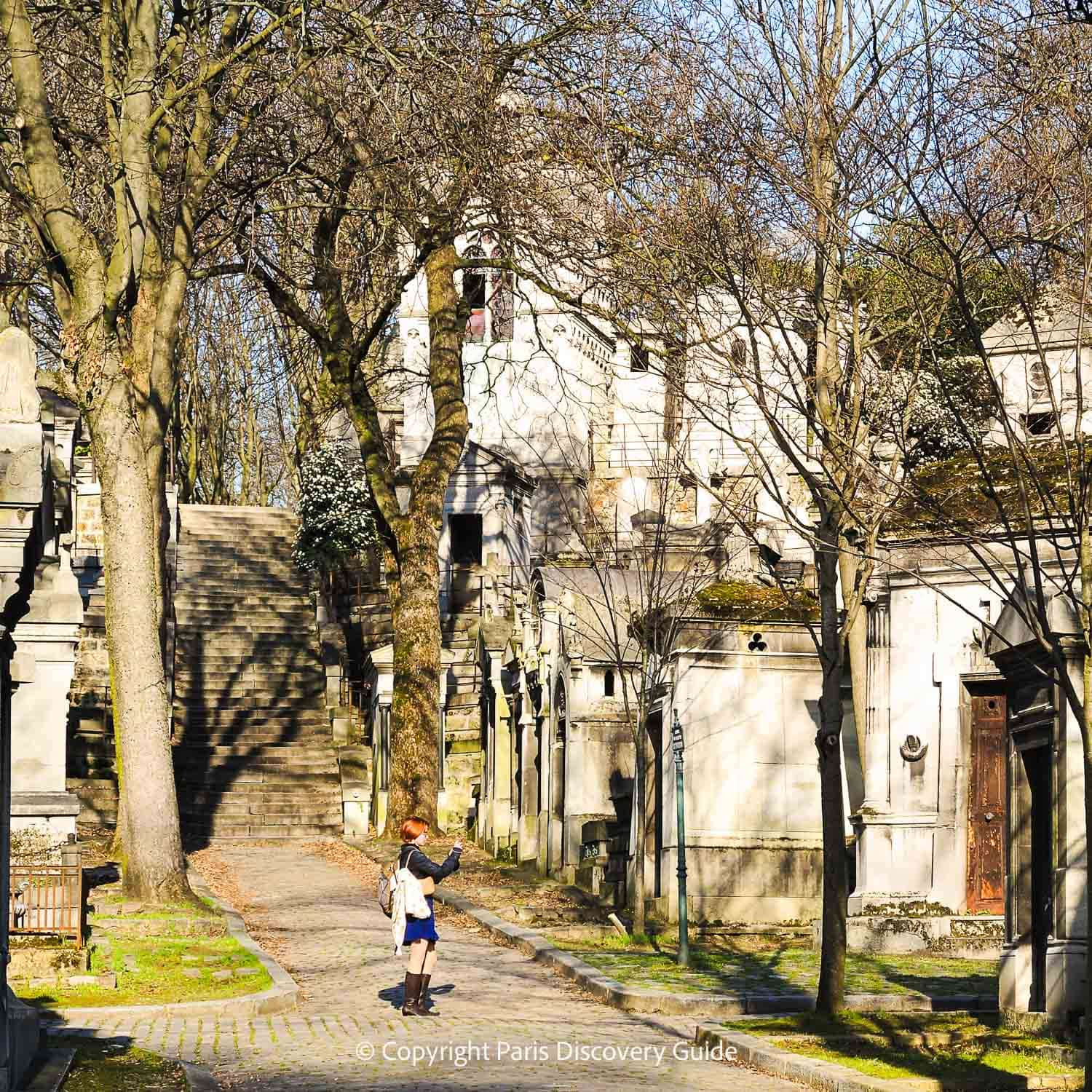
Why visit: The 20th's biggest attraction is Cimetière du Père-Lachaise - the famous Père Lachaise Cemetery - where rows of ornate tombs and monuments of famous writers, musicians, artists, philosophers, and politicians perch on the landscaped hills. The 20th District also includes a swath of the sprawling and dynamic Belleville neighborhood, which spans parts of the 19th, 10th, and 11th districts as well.
Discover: The final resting spots of Jim Morrison, Oscar Wilde, Frédéric Chopin, Edith Piaf, Rossini, and many other luminaries at Père-Lachaise, along with some of the city's most fascinating and poignant tombstones. For a special experience, take a guided tour (or choose a small-group or private option).
Where to find the most famous 101 graves at Père-Lachaise
Enjoy: Sweeping views of Paris from a hilltop covered terrace adorned with graphic art in Parc de Belleville, and at the back, a small historical vineyard; down the side of the hill is a 300-foot long tiered waterfall-fountain, plus expanses of award-winning flower gardens.
Explore: The interesting street art, indie boutiques, art galleries, green space, and the city's second largest Chinatown (complete with wonderful, affordable restaurants) in Belleville. And on the other side of the Périphérique from the 20th: Montreuil Flea Market
Find out where to stay in Paris's 20th arrondissement
Paris Hotel Map - Where to Stay in Your Favorite Paris District
Want to find a convenient Paris hotel or apartment close to your bucket list attractions?
Find out where to stay on your first trip to Paris: best neighborhoods
Use this map to find available accommodations & best rates for your travel dates, and make your reservations:
More to Know about Paris Arrondissements, Names, Quarters, & Neighborhoods
Paris Districts: Do They Have Names?
Yes. Each arrondissement has a historical name in addition to a number. But there's no need to learn them because they are not normally used in daily conversation, directions, or much of anything else.
You'll almost always hear Parisians refer to districts by only the number. For example, "She works in the 7th."
Confused? Don't worry about it. By the time you've spent a few days in Paris, all of this will make more sense.
The practice of compartmentalizing Paris into administrative districts and numbering them sequentially dates back to 1795 when the city was divided into 12 arrondissements.
In 1860, Emperor Napoleon III more than doubled the size of the city by annexing 11 surrounding towns and expanding the number of arrondissements to the present 20.
The recent formation of "Paris Centre" by administratively combining the first four districts doesn't really change much. The only practical difference is that now the Paris Centre arrondissements share one mayor and one city hall. So don't worry - everyone still refers to them as the 1st, 2nd, 3rd, and 4th.
Is a Quartier (Quarter) the Same as a Neighborhood in Paris?
Sometimes - but not usually.
Each of Paris's 20 arrondissements contains four distinct quartiers (administrative sub-districts) and each quartier has a historical name.
Although many quartier names such as Croulebarbe and Gaillon are no longer used in everyday conversation, others such as Les Halles (1st arrondissement), Sentier (2nd), Saint-Germain-des-Prés (6th) - serve double duty as neighborhood names, although (just to keep things confusing) neighborhood boundaries usually don't align with quartiers boundaries.
Additionally, some neighborhood names such Latin Quarter and Marais reflect what Parisians have traditionally called the area, and have no relationship at all to the names of their quartiers.
For example, the Latin Quarter covers an area in the 5th, 6th, and even a bit of the 13th districts where students from all other Europe gathered during the Middle Ages while studying at the Sorbonne University. They spoke Latin as their common language, and that's how this Paris neighborhood got its name.
Similarly, the chic Marais neighborhood spanning large swaths of the 3rd and 4th arrondissements used to be swamp land, and so Parisians called it (somewhat derisively) Le Marais ("the swamp").
Bottom line: Paris neighborhood names and locations within or across arrondissements are useful to know. Quartier names, not so much.
What Arrondissement Has the Most Tourist Attractions?
Probably the 1st arrondissement (although not everyone may define "tourist" attraction the same way).
In this old and historical Paris area, you'll find the Louvre Museum (former Palais du Louvre, home to Paris kings and queens, and now the world's most-visited museum.
More to the point, Paris 1 is where you can visit Sainte Chapelle with its stunning gorgeous medieval stained glass walls and wonderful classical concerts and La Conciergerie, a medieval palace and Reign of Terror prison. Both are located on Ile de la Cité - but only half of the island is in the 1st; the rest, including the part with Notre Dame Cathedral) is in the 4th.
Across the Seine on the Right Bank is the rest of the 1st, and that's where you'll find da Vinci's Mona Lisa) in the Louvre, Monet's famous water lily paintings in Musée de l'Orangerie, the Forum des Halles shopping center where the old Les Halles wholesale food markets once stood, some of the city's best kitchenware stores (including Dehillerin), part of the appealing Rue de Montgoreiul market street, along Rue Saint Honoré with its numerous designer boutiques, Tuileries Garden, and the Palais Royal Garden, just to name a few of the top attractions.
And last but certainly not least, the 1st is where you'll find the super-popular Tuileries Christmas Market and Hotel de Ville Christmas Market.
What Does "1er" Mean? What about "1ère"?
This is how Parisians (and everyone else in France) abbreviates "1st Arrondissement" ("la premier" in French) - and yes, there's a very short ("1er" or "2e" etc) and a slightly longer ("1ère" or "2ème") way (which you'll much less frequently see written as "1ière" or "2ième") to do this and both are used interchangeably.
Although the longer version is technically incorrect, that doesn't stop people from using it - so don't be startled if you see it.
However ... older street signs may show the arrondissement number as a Roman numeral - so if you're feeling fuzzy about whether "IX" means 9 or 11 (or maybe 4 or 6), brush up on those as needed. (This really isn't a quiz, but here's the "answer": IX = 9)
Here's a cheatsheet with arrondissement numbers in English, French (along with Roman numerals), short and longer French abbreviations, and historical names in case you do happen to hear them:
Arrondissement
- First (1st)
- Second (2nd)
- Third (3rd)
- Fourth (4th)
- Fifth (5th)
- Sixth (6th)
- Seventh (7th)
- Eighth (8th)
- Ninth (9th)
- Tenth (10th)
- Eleventh (11th)
- Twelfth (12th)
- Thirteenth (13th)
- Fourteenth (14th)
- Fifteenth (15th)
- Sixteenth (16th)
- Seventeenth (17th)
- Eighteenth (18th)
- Nineteenth (19th)
- Twentieth (20th)
In French
- Première (I)
- Deuxième (II)
- Troisième (III)
- Quartrième (IV)
- Cinquième (V)
- Sixième (VI)
- Septième (VII)
- Huitième (VIII)
- Neuvième (IX)
- Dixième (X)
- Onzième (XI)
- Douzième (XII)
- Treizième (XIII)
- Quatorzième (XIV)
- Quinzième (XV)
- Seizième (XVI)
- Dix-septième (XVII)
- Dix-huitième (XVIII)
- Dix-neuvième (XIX)
- Vingtième (XX)
Abbreviations
- 1re (1ère)
- 2e (2ème)
- 3e (3ème)
- 4e (4ème)
- 5e (5ème)
- 6e (6ème)
- 7e (7ème)
- 8e (8ème)
- 9e (9ème)
- 10e (10ème)
- 11e (11ème)
- 12e (12ème)
- 13e (13ème)
- 14e (14ème)
- 15e (15ème)
- 16e (16ème)
- 17e (17ème)
- 18e (18ème)
- 19e (19ème)
- 20e (20ème)
Name
- Louvre
- Bourse
- Temple
- Hôtel de Ville
- Panthéon
- Luxembourg
- Palais-Bourbon
- Élysée
- Opéra
- Entrepôt
- Popincourt
- Reuilly
- Gobelins
- Observatoire
- Vaugirard
- Passy
- Batignolles-Monceau
- Butte-Montmartre
- Buttes-Chaumont
- Ménilmontant
Pin Now, Read Again Later
More Articles about Paris Districts & Neighborhoods
- Where to Stay on Your First Trip to Paris: Best Neighborhoods
- Find out about Île de la Cité's medieval masterpieces in the heart of Paris
- Where to stay in the 1st arrondissement: Paris hotel recommendations
- Best 4-star Paris hotels near the Arc de Triomphe
- New hotels in some of Paris's trendiest districts


